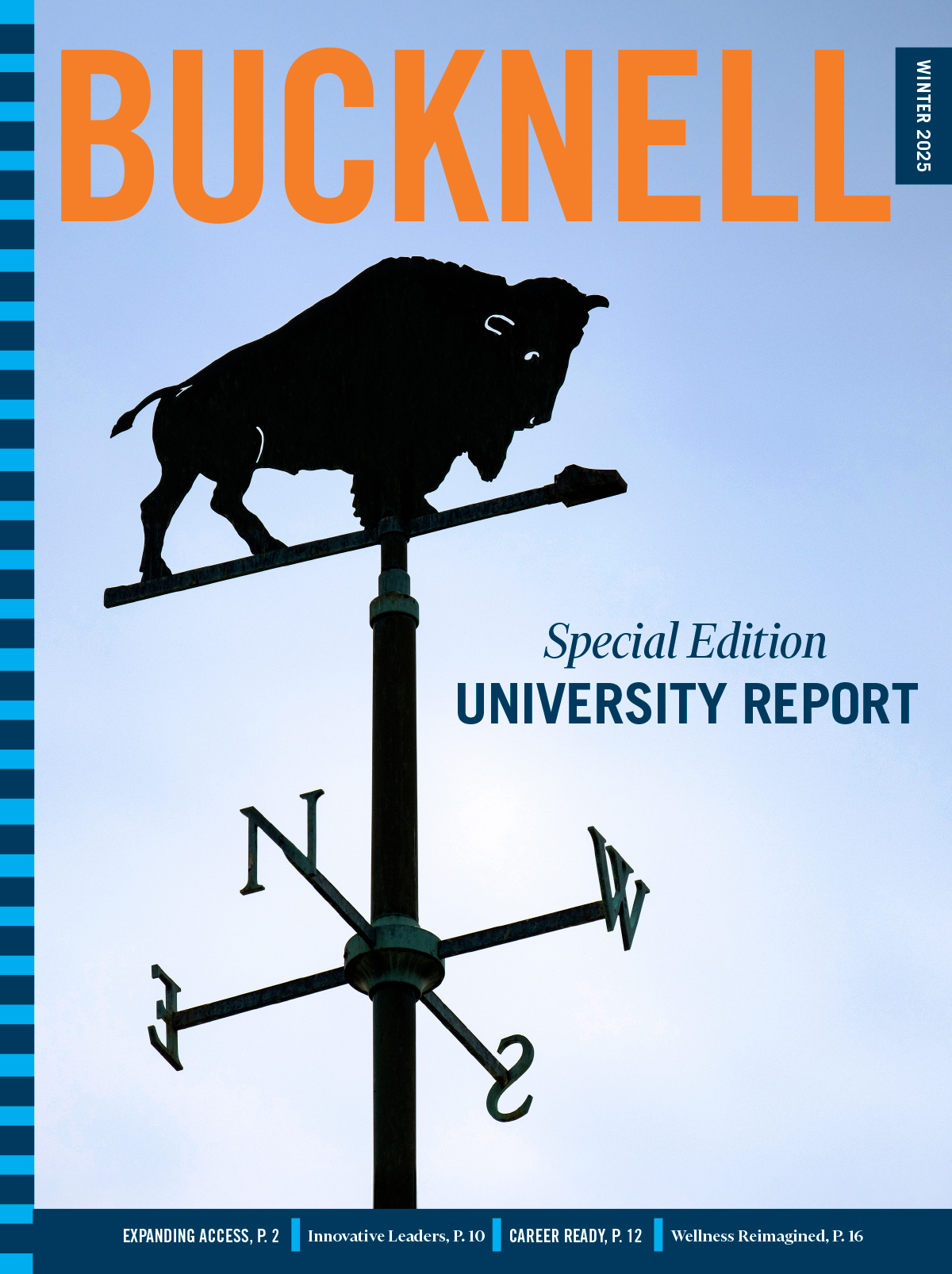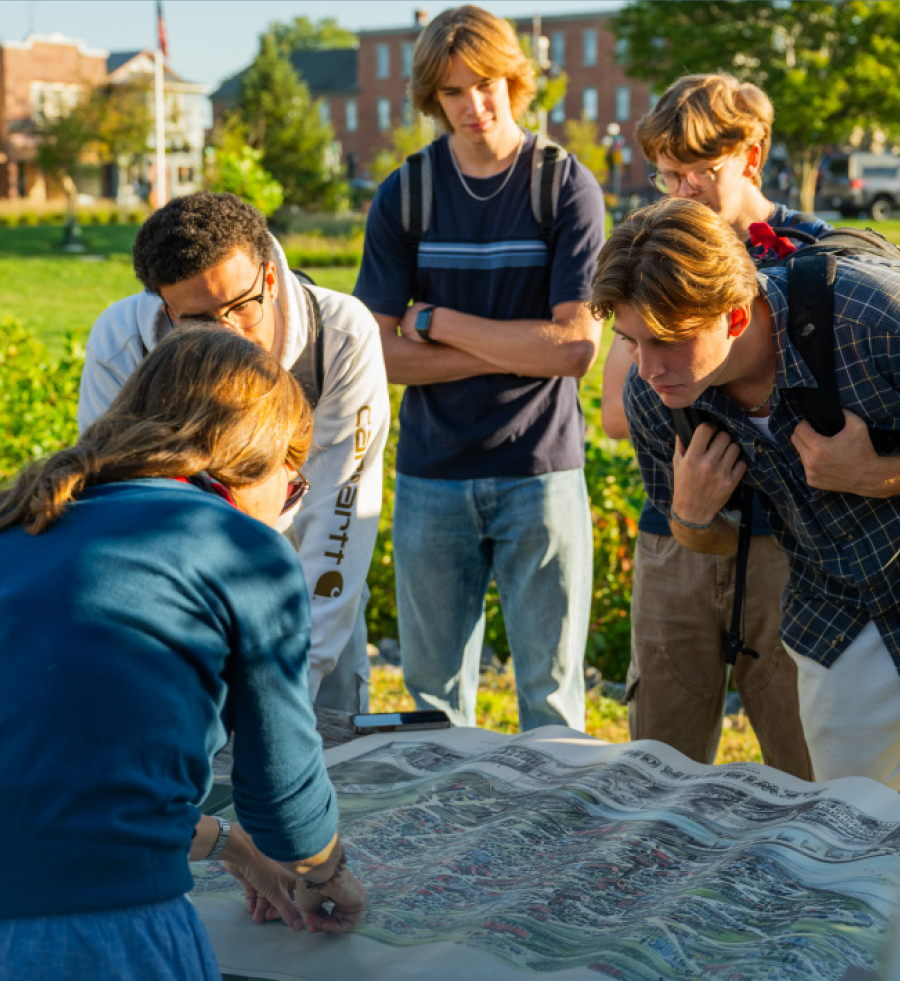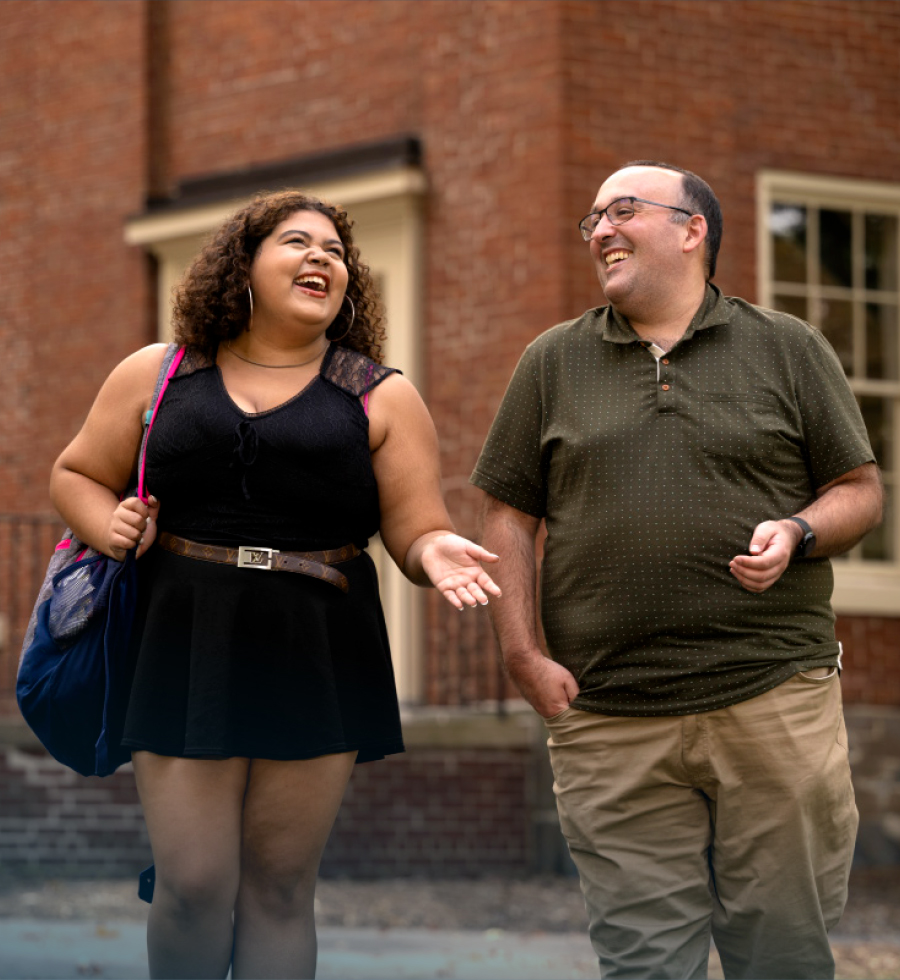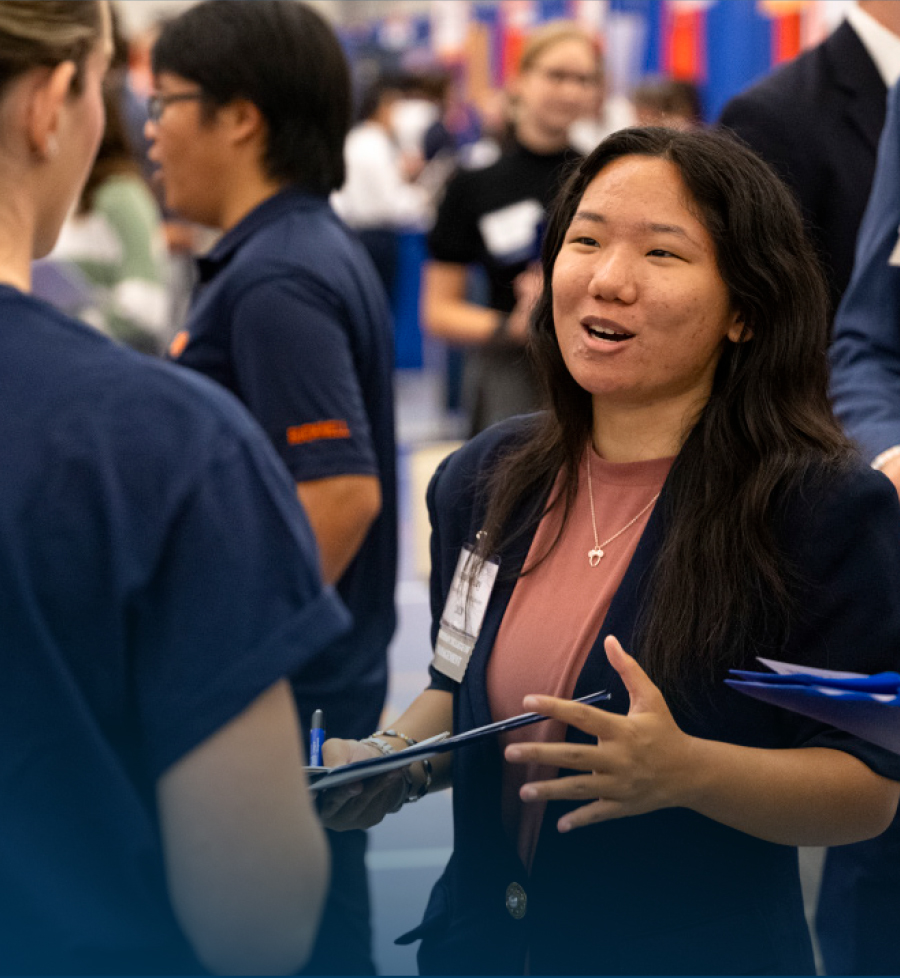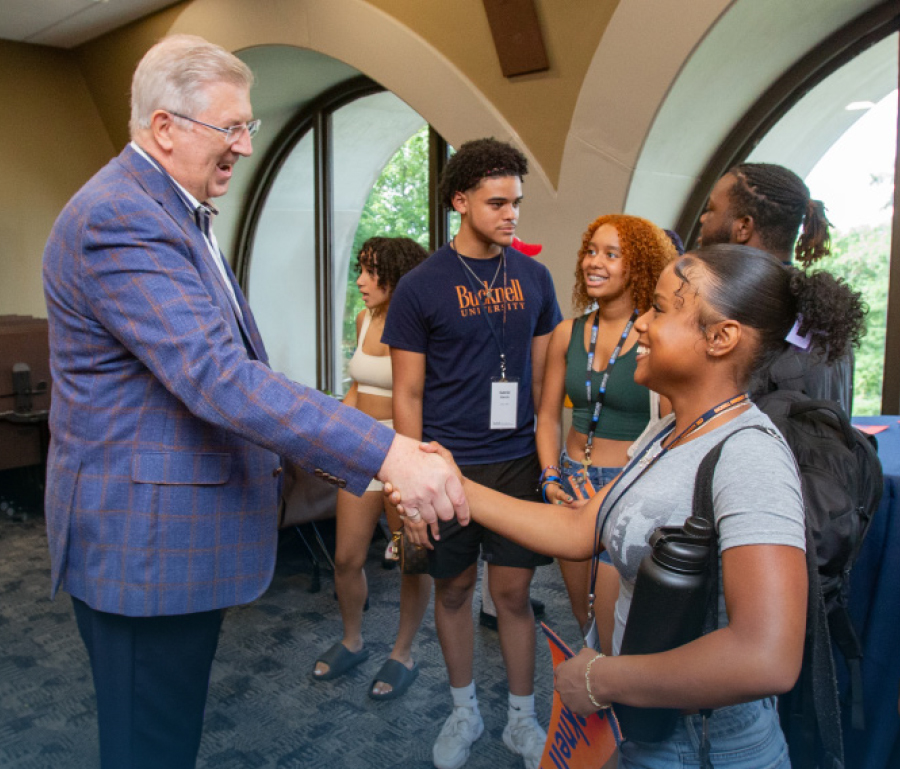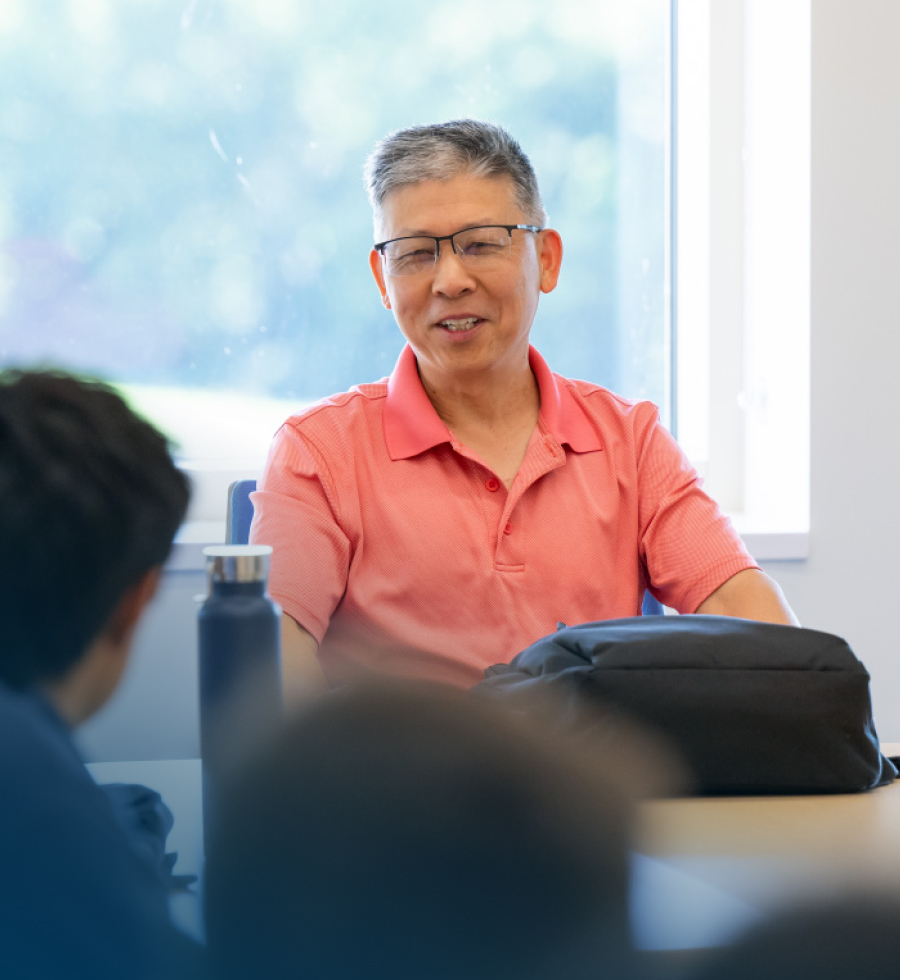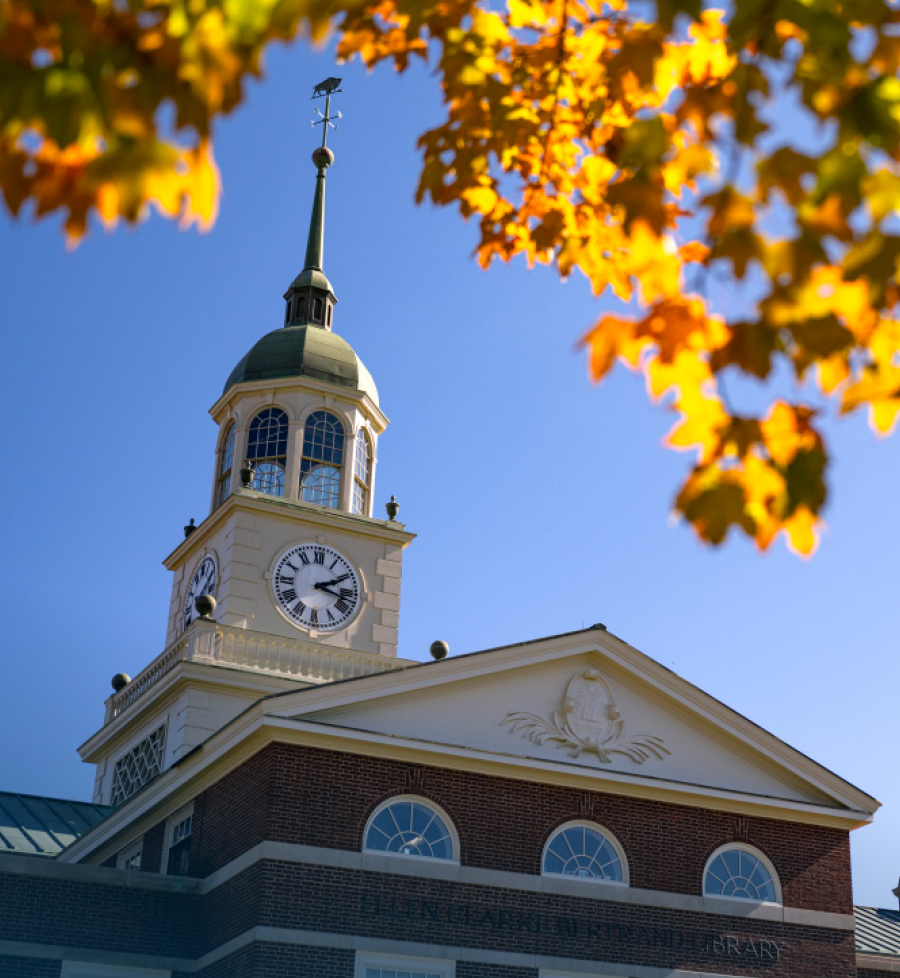Dear Bucknellians,
n an increasingly complex higher education landscape, Bucknell continues to distinguish itself as a leader by anticipating challenges and seizing opportunities. I’m pleased to share with you our 2024 University Report — a special edition of Bucknell Magazine that celebrates our recent accomplishments and looks forward to the year ahead.
Much of our success is rooted in our unwavering commitment to educating the whole student. By remaining true to our mission and focusing on the strategic priorities set forth in The Plan for Bucknell 2025, we have been able to expand upon our exceptional academic program and enhance student life as never before.
In these pages, you’ll read about new academic centers that create exciting opportunities for collaboration at the crossroads of our three colleges, increased access and support for students with financial need, new health and wellness initiatives, advances in sustainability and community engagement, strides in making Bucknell equitable, inclusive and welcoming for all — and much more.
Our campus brims with creativity, discovery and achievement, and I hope you’re as proud as I am to be part of this extraordinary community.

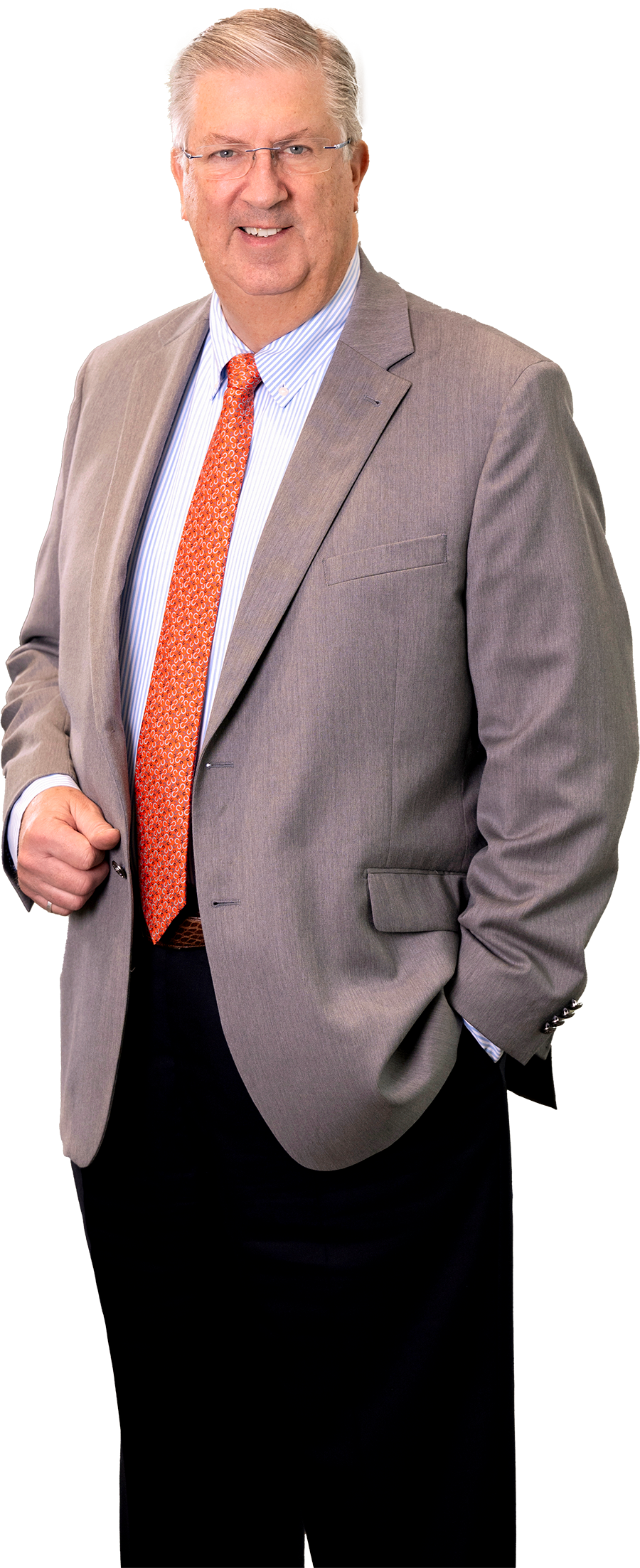
Dear Bucknellians,
n an increasingly complex higher education landscape, Bucknell continues to distinguish itself as a leader by anticipating challenges and seizing opportunities. I’m pleased to share with you our 2024 University Report — a special edition of Bucknell Magazine that celebrates our recent accomplishments and looks forward to the year ahead.
Much of our success is rooted in our unwavering commitment to educating the whole student. By remaining true to our mission and focusing on the strategic priorities set forth in The Plan for Bucknell 2025, we have been able to expand upon our exceptional academic program and enhance student life as never before.
In these pages, you’ll read about new academic centers that create exciting opportunities for collaboration at the crossroads of our three colleges, increased access and support for students with financial need, new health and wellness initiatives, advances in sustainability and community engagement, strides in making Bucknell equitable, inclusive and welcoming for all — and much more.
Our campus brims with creativity, discovery and achievement, and I hope you’re as proud as I am to be part of this extraordinary community.
Sincerely,

bucknell.edu/bmagazine
Contact
bmagazine@bucknell.edu
Class Notes will resume in the Spring 2025 issue:
classnotes@bucknell.edu
(ISSN 1044-7563), of which this is volume 18, number 1, is published in winter, spring, summer and fall by Bucknell University, One Dent Drive, Lewisburg, PA 17837. Periodicals Postage paid at Lewisburg, PA, and additional mailing offices.
Permit No. 068-880.
49,000
Postmaster
Send all address changes to:
Office of Records, 301 Market St., Suite 2
Bucknell University, Lewisburg, PA 17837
© 2025 Bucknell University
Championing Access
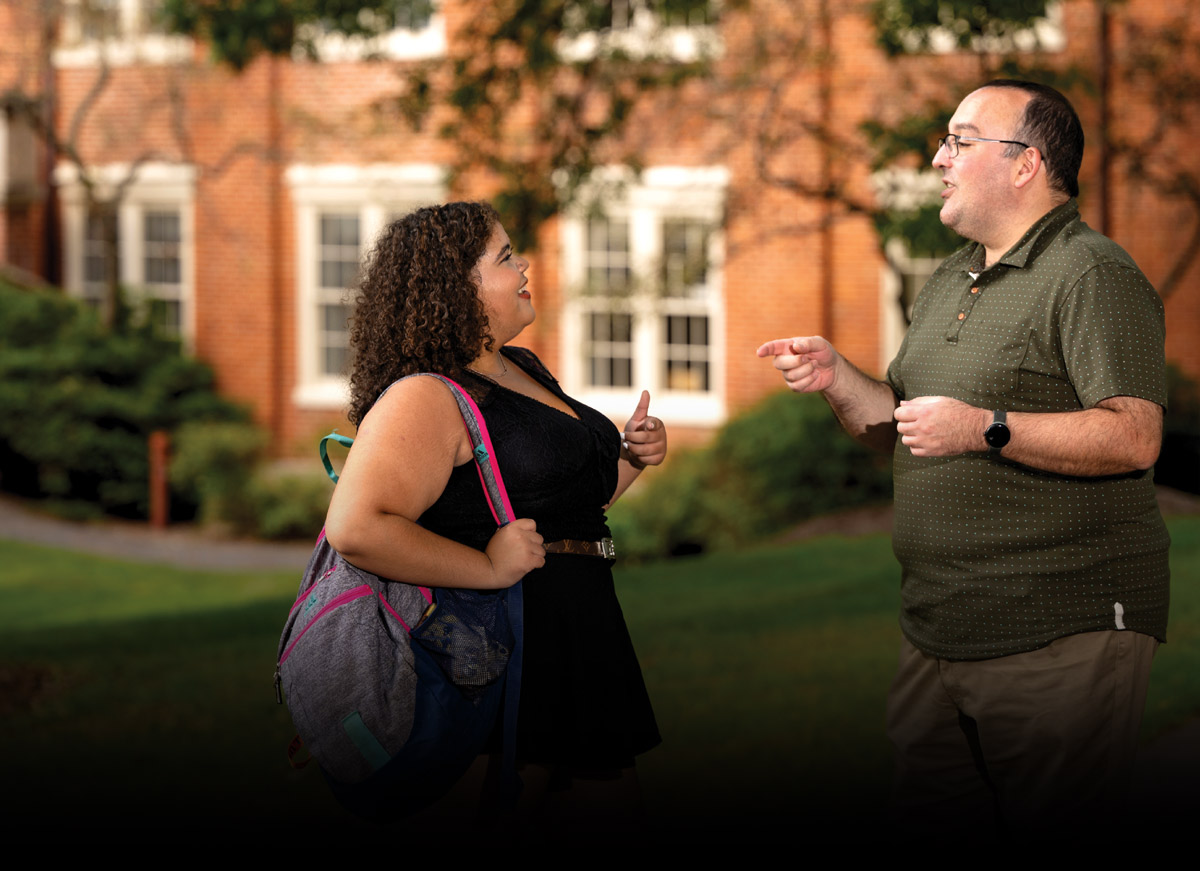
Success Starts with Support
n its first year, Bucknell’s Center for Access & Success has built a supportive community for students in the University’s five national and signature pathway scholarship programs.
Chris Brown, the Andrew Hartman ’71 & Joseph Fama ’71 Executive Director of the Center for Access & Success (above, right), guides the center’s growth through initiatives aligned with The Plan for Bucknell 2025. He focuses on building bridges as much as developing new programming, connecting students with Bucknell’s extracurricular offerings and creating mission-focused initiatives to fill support gaps when necessary.
Partnerships with the Center for Career Advancement, Office of Global & Off-Campus Education and others amplify the cross-campus commitment to holistic student support. From those collaborations, Brown’s team has developed new access initiatives to help students confidently pursue study abroad programming, as well as internship and networking opportunities and a grant program to provide funding for students who choose to participate. (Learn more about these programs on P. 5.)
In addition to helping students make practical connections, the center creates a sense of belonging. The Axis Lounge, nestled at the heart of the Center for Access & Success in Taylor Hall, is a cozy, comfortable space where students can gather. Through partnerships with the Posse Foundation, Bucknell’s GenFirst! program and the First Scholars Network, the center also provides mentorship, academic guidance and leadership development.
“Each student needs different resources to help engage fully in campus life,” Brown says. “We’re creating a broad network of touchpoints to help students thrive — from enrollment through graduation and beyond.”

‘A Place to Call Home’
While home for break after her first semester, she was surprised to find herself missing Lewisburg. “I came back to campus with a refreshed mindset,” she says. “When I started participating in programs offered in the Center for Access & Success that spring, I finally realized Bucknell’s potential for me.”
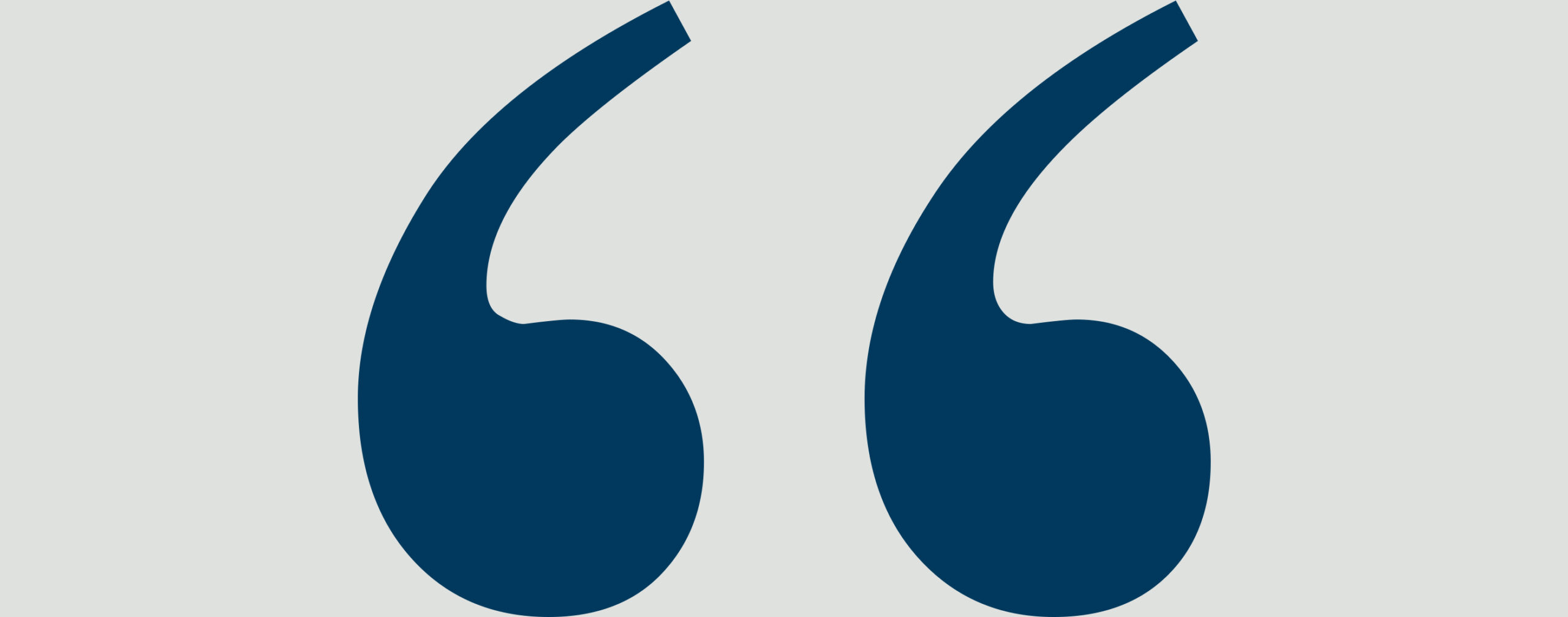
Now, as a junior fellow with the center, Reynolds wants to help other Bucknellians find belonging. “I love being be part of the work that is helping other students find a place to call home,” she says.
Access Granted
xperiential learning is an essential component of the Bucknell academic journey. By participating in research projects, internships, study abroad programs and summer courses, students develop practical skills and cultivate a deeper understanding of the world. Thanks to the generosity of Glen Tullman ’81, students associated with the Center for Access & Success can fully immerse themselves in these transformative experiences by applying for a Candland Educational Impact Grant, named for the late Professor Douglas K. Candland, psychology and animal behavior.
The grants provide essential funding to students, removing financial barriers and enabling them to take advantage of opportunities that foster personal, academic and professional growth. More than 20 students have received Candland grants to cover travel, living and enrollment costs.
Jerimaha McClain ’26, a management & organizations major from Bowie, Md., was among the first Candland grant recipients. The award supported his summer 2024 internship at Krispy Kreme in Charlotte, N.C., providing funding to help cover his living expenses. McClain first visited the company’s headquarters as a first-year student with the Taste, Tech & Teamwork Pre-Orientation program. While there, he met chief brand officer Dave Skena ’92. Two years later, that networking moment turned into an internship opportunity. McClain put his education to work as a global operations intern, gaining firsthand insight into the complexities of a corporation that operates in more than 40 countries.
“This grant program was put in place to ensure that all students in the Center for Access & Success can participate in programming that enhances their education,” says Executive Director Chris Brown. “We want students to take full advantage of this generous funding, and we can’t wait to see the impact of their experiences.”
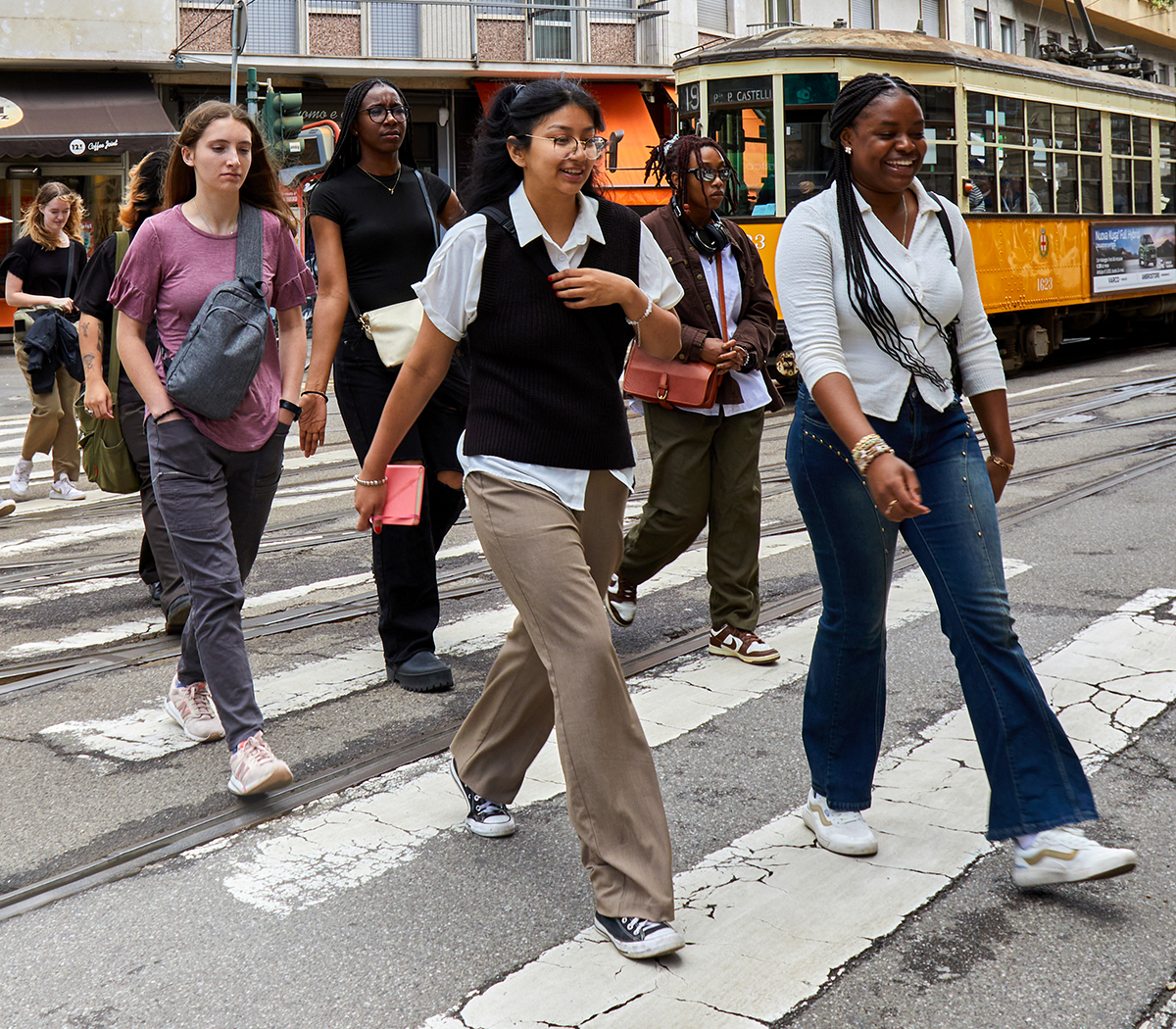
Building Pathways
- Access to Global Education is a program designed to ignite interest in international travel and enable students to integrate studying abroad into their Bucknell experience. Students are coached on cultural humility and securing financial aid in addition to necessities like obtaining a passport and planning travel. The program culminates in a spring break trip abroad, and ongoing support is available to help students plan future study abroad opportunities.
- Access to Career Advancement is designed to boost professional readiness by offering a range of resources to help students explore career interests, build essential skills, and prepare for internships and job applications. In partnership with the Center for Career Advancement, this program equips students with tools for success through resume and cover letter labs, career workshops, and opportunities to attend career fairs, alumni panels and field trips. Participants also receive a professional headshot, personalized networking cards and a stipend to build a professional wardrobe.
- Access Advocates provide each new student affiliated with the center personalized support from a dedicated mentor. Inspired by the successful Posse Foundation mentor model, the program pairs committed faculty and staff members with students to help them navigate their academic and personal journeys at Bucknell. Through regular one-on-one meetings and group activities, Access Advocates guide students in exploring new opportunities, addressing challenges, connecting with valuable campus resources and building a meaningful community.
Attracting the Best and Brightest
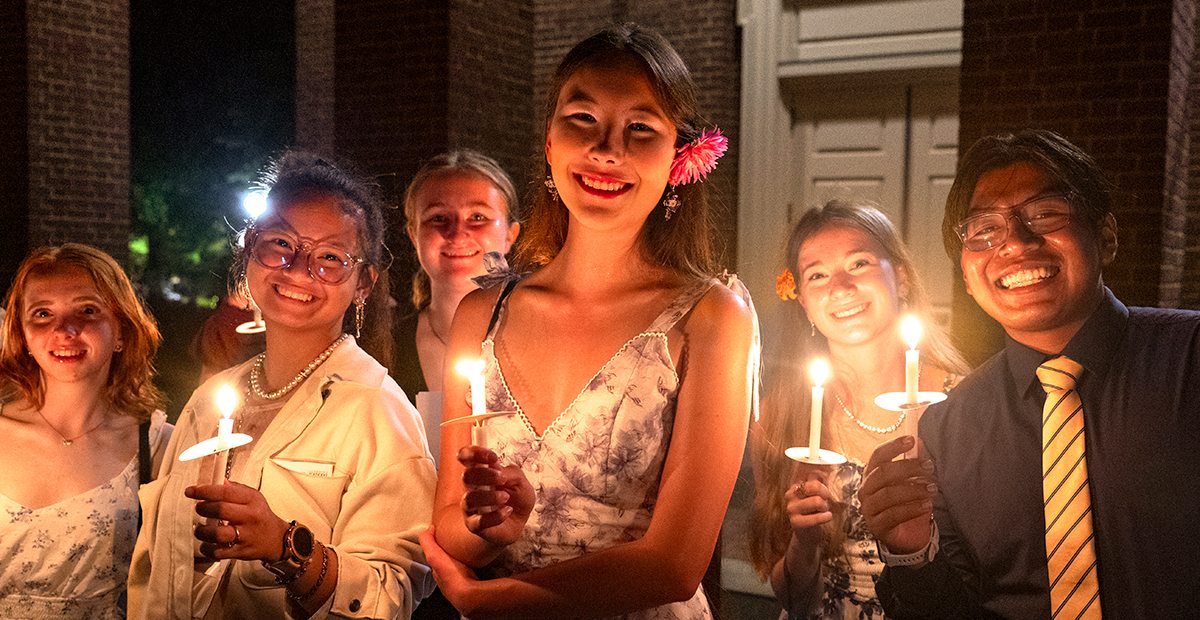
Resilience in Action
n a year marked by unprecedented challenges in college admissions, particularly following the Supreme Court’s 2023 decision on affirmative action, Bucknell has shown strategic agility and commitment to its core values. The ruling struck down race-conscious admissions policies, requiring institutions to adjust their approaches to creating diverse student bodies. Bucknell, well prepared to pivot effectively, celebrated its 179th academic year with a record total enrollment for the fourth consecutive year, welcoming 3,950 students, including 994 first-year students. This new class stands out for its academic strength (with an average high school GPA of 3.62) and also for its diversity, with 23.5% students of color and representation from 37 states, Washington, D.C., Puerto Rico and 54 countries.
Kevin Mathes ’07, associate vice president & dean of admissions, emphasizes the significance of this achievement, noting that the Class of 2028 is a testament to Bucknell’s dedication to attracting bright minds and offering opportunities to students from all walks of life. “Bucknell has succeeded in bringing together a talented and diverse student body, united by their academic achievements and commitment to making a positive impact,” Mathes says.
Three key initiatives drove this success. First, Bucknell significantly increased its outreach efforts, connecting with a broader range of prospective students. Second, the University deepened its partnerships with organizations supporting historically underrepresented students. Finally, Bucknell launched new pathway scholarship programs in collaboration with the Center for Access & Success.
Adding to this momentum, Bucknell reimagined its merit scholarship program this fall. The scholarships, designed in collaboration with the deans of Bucknell’s three colleges, will offer opportunities that reflect the individual strengths of each college and will be the largest at the University, awarding $40,000 per year.
Restoring Civility
Each circle accommodates up to 25 participants and employs a method rooted in Indigenous restorative practices. The approach encourages empathetic listening and respectful engagement, says Jocelyne Scott ’11, senior director of equity and strategic initiatives. Five sessions were held during the fall semester, discussing topics including political division and maintaining civility post-election. Additional sessions will be held in the spring. The goal is for students to carry these skills into their personal and professional lives, contributing to a more understanding society.
Bucknell Scholars Shine
- NSF Graduate Research Fellowships: Ally Clarke ’24, Georgia Corbett ’24, Marianne Voigt ’24
- Goldwater Scholarships: Alejandro Vargas-Altamirano ’25, Marion Duval ’25, Grace Ginder ’25
- Fulbright Scholarship: Bret Hatzinger ’24
- Beinecke Scholarship: Gwen Radecki ’25
- Thomas R. Pickering Foreign Affairs Graduate Fellowship: Michaiah Augustine ’24
- Boren Scholarship: Caroline Corbett ’26
Learning Without Boundaries
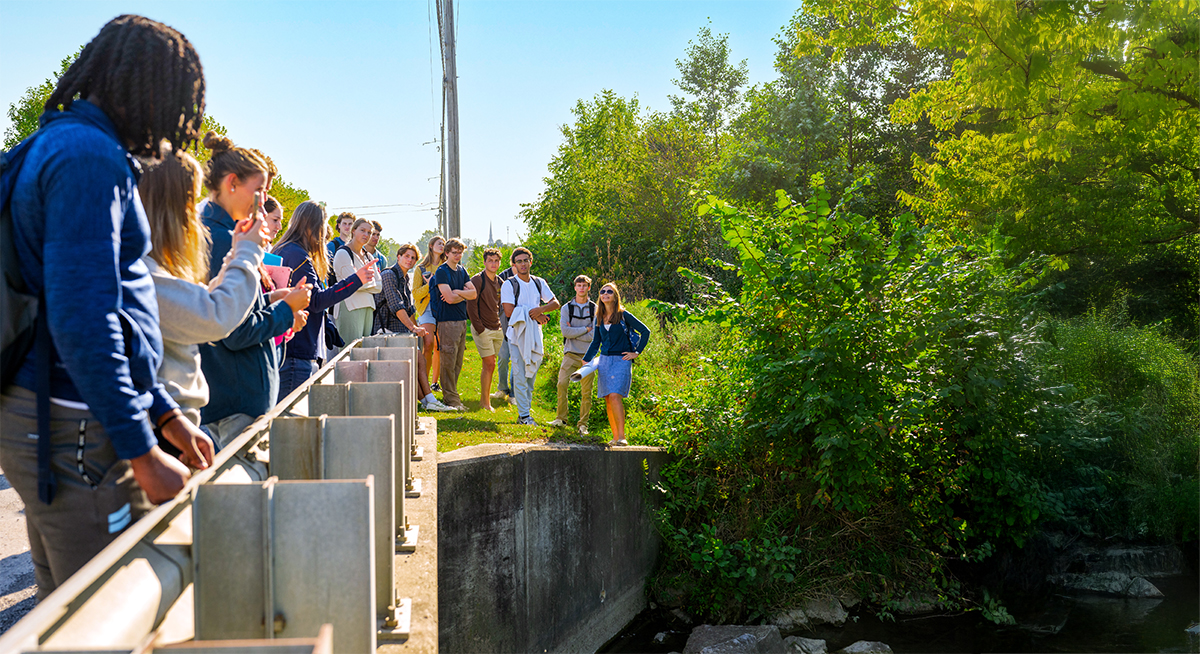
Students in the Water Resources Engineering course conduct fieldwork to learn about the political, social and cultural forces that have shaped access to humanity’s most indispensable resource.
Bridging Disciplines, Solving Challenges
ucknell’s commitment to interdisciplinary education creates unique learning opportunities that prepare students to tackle the world’s most pressing challenges. For example, two Bucknell faculty members from different colleges have joined forces to address the management of Earth’s most precious and finite resource: water.
“When we started to discuss changes to our more traditional Water Resources Engineering course, we wanted to bring engineering students outside their comfort zone and introduce new ways to think about the same problems,” says Professor Jessica Thomas Newlin ’98, civil & environmental engineering. She and Professor Claire Campbell, history, designed the course to teach engineering students to think of water not only as a physical resource to be managed but also as a product of political, social and cultural forces across history.
“We feel it’s essential to teach students to consider the human history, experience and record of the decisions that they will make as practicing engineers, particularly because we’re promising a liberal arts education for students in any college here,” says Campbell.
This course is part of a broader initiative within the civil & environmental engineering department to introduce students to humanities-based frameworks for assessing engineering challenges. Engineers in this field not only handle technical aspects but also work on infrastructure projects that directly impact communities and populations. By merging these disciplines, Bucknell is cultivating a new generation of engineers who understand the mechanics of water systems and appreciate the complex human narratives that shape and are shaped by these systems.
Fueling the Humanities
A generous endowment gift from Laurel and Michael Fountain ’91 will enhance the Bucknell Humanities Center (BHC), established in 2016 with initial support from President John Bravman and a $600,000 grant from the Andrew W. Mellon Foundation. This funding will strengthen the center’s commitment to enriching students’ understanding of themselves and the world through deep engagement with human histories, cultures and experiences. The BHC funds faculty research and teaching grants, supports student honors theses, mentors student Humanities Fellows and coordinates yearly programming. With this support and the newly formed BHC Alumni Advisory Council, the center aims to expand its commitment to scholarship, pedagogical innovation and interdisciplinary collaboration.
Innovation in Action
n the Perricelli-Gegnas Center for Entrepreneurship & Innovation, Bucknellians pursue big ideas as they contribute to a growing culture of curiosity and creativity. Director Erin Jablonski is leading the center’s development with a clear vision focused on ensuring students take purposeful action in pursuit of their goals. Through interdisciplinary collaboration, students across the University’s three colleges will work on innovative projects that span diverse fields. Drawing from multiple perspectives, the center invites students to explore, experiment and develop creative solutions to real-world challenges.
Jablonski’s mission: To help students take an idea from concept to existence. Her goal is to establish the center as a resource hub where students can find mentorship to expand their perspectives and refine their creative and business skills.
The power of “why?”: Jablonski advises students to embrace an entrepreneurial mindset. “We encourage students to be curious, to walk through the world with their eyes wide open and to ask, ‘Why do we do this, and why this way?’ ” Jablonski says. “This is how they will recognize opportunities for change.”
“Future-proofing” ideas: To effect change, Jablonski says students must do the research needed to ensure credibility. Jablonski says this is a central purpose of the college experience, and she is committed to helping students gain knowledge, challenge convention and examine the consequences of action and inaction. “Good entrepreneurship requires thoroughly knowing your ‘who.’ Who cares? Who does this serve? Who is impacted?” she says. “To really create enduring value, the creator must lean into future-proofing. When an entrepreneurial mindset has been expansively embraced, and real value has been created for society, only then can we measure the impact of actions.”
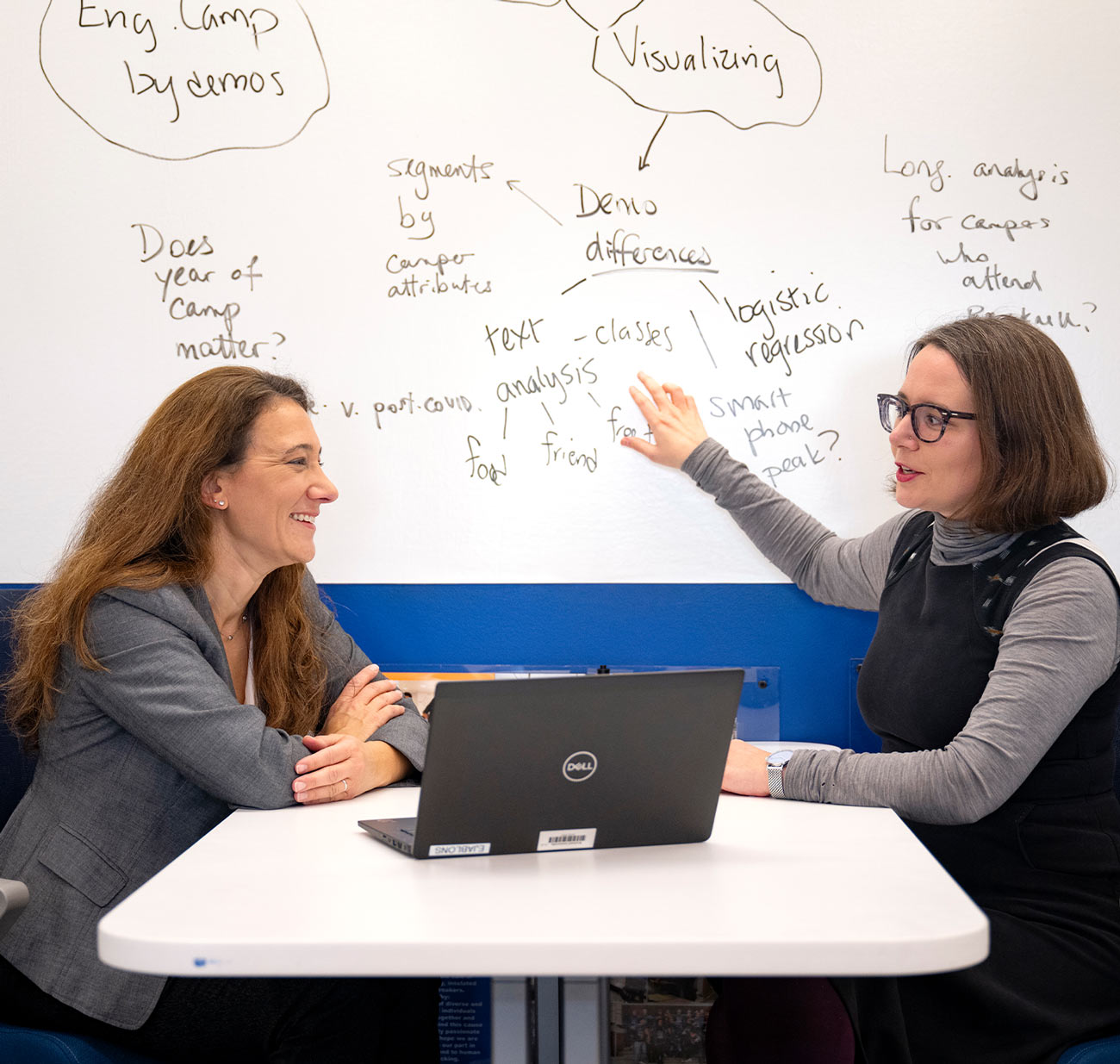
Erin Jablonski (left) and Kelly McConville are driving exciting initiatives as the directors of two new academic centers.
Shop, Sell, Succeed
Driven by Data
ata is everywhere, and learning how to use and understand it is a critical skill. Kelly McConville, the director of the Dominguez Center for Data Science, empowers students, faculty and staff in Bucknell’s three colleges to harness the power of data in their academic and professional pursuits. By promoting data literacy across disciplines, the Dominguez Center ensures all Bucknellians possess the skills to navigate our data-driven world.
McConville’s mission: To make the center a hub for data science practice and education that offers hands-on opportunities to enhance data collaboration and literacy. In her first year, McConville is guiding the Data Science Student Fellows Program, launching workshops and learning communities, and gathering community feedback to ensure the center’s growth is based on data-driven insights.
Elevating analysis: McConville aims to foster a data-informed approach to problem-solving within the Bucknell community that will promote research, generate new discoveries and prepare students to lead in their fields. “Data-driven conclusions are often presented as facts in the news and academic spaces,” she says. “But to contribute to conversations based on data, students need to be more than passive consumers of data-driven information — they must be active generators of data-informed discoveries.”
Data for all: Through the center’s programming, McConville is working to lower the barrier to entry into data exploration, capitalizing on approaches and methodologies common to other disciplines. “I see great potential for our community to guide a human-centered approach to data science,” she says. “Thoughtful, engaged collaborations will help us think through the implications of our work. I hope students will learn to reflect on their decision analysis, understand the societal impact of their conclusions and show a curiosity for examining and thinking about data.”
Addressing AI
That’s why she’s focused on helping the Bucknell community examine the unanswered questions: Who gets to design AI models? What data should be used? How should we prioritize which problems AI can and should address? And how are we going to regulate and govern AI? McConville will lead efforts to enhance AI literacy on campus, emphasizing the need for an interdisciplinary approach to address these challenges.
“Society will need AI-literate people to help answer these questions,” she says. “With our three-college structure, Bucknell is poised to lead the conversation on responsible AI.”
Beyond the Classroom
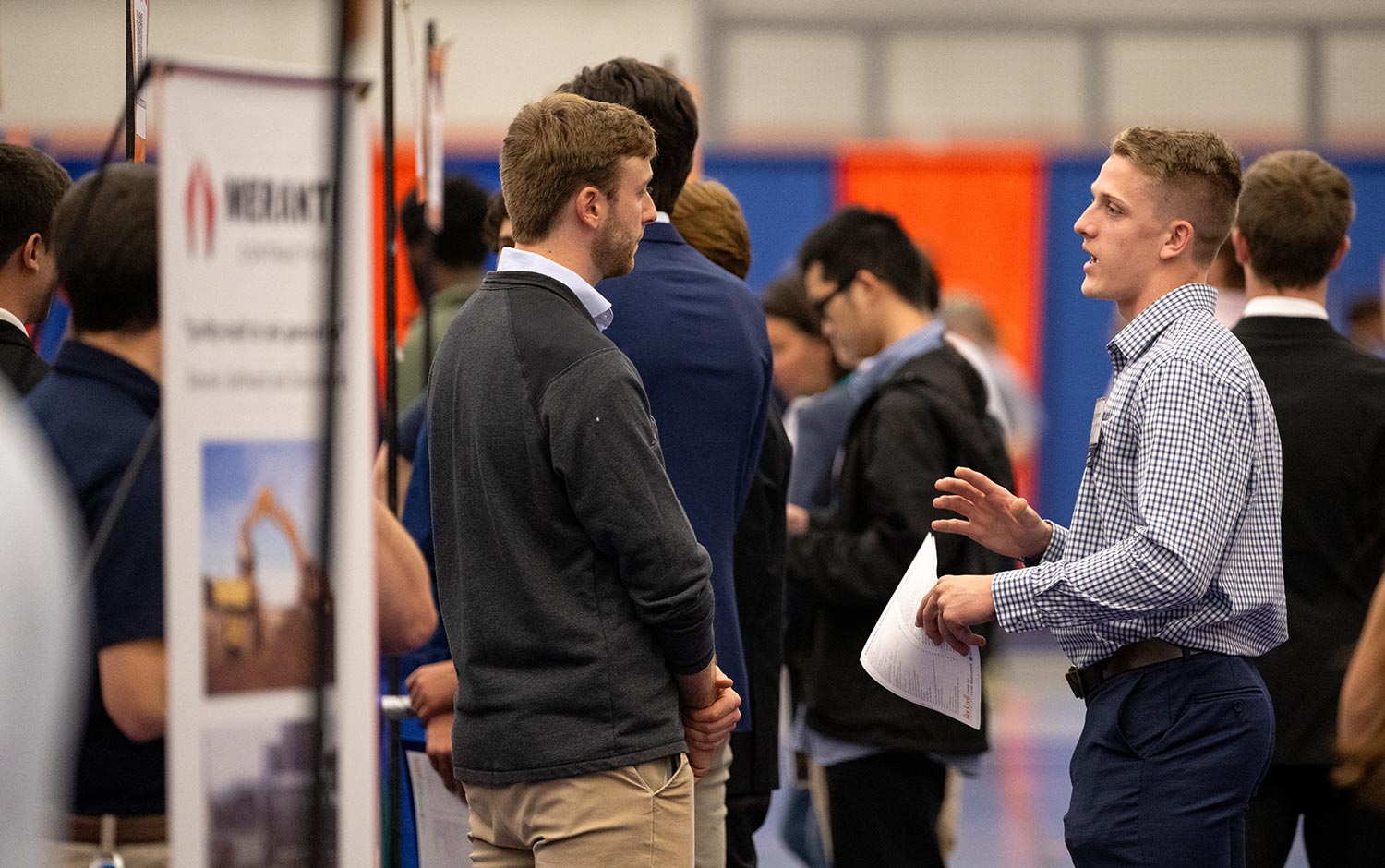
Building Career Confidence
ucknell’s Center for Career Advancement (CCA) supports students throughout their four years, providing personalized guidance and resources to ensure they are prepared for life after graduation. From one-on-one career counseling and internship opportunities to skill-building workshops, career fairs (right) and networking events with alumni, the CCA equips students with the tools and confidence needed to navigate their career paths.
One of the many innovative programs created by the CCA is the JumpStart Your Career course. Paloma Flores Montero ’25, a markets, innovation & design major from Allentown, Pa., arrived at Bucknell as a transfer student through the Bucknell Community College Scholars Program. She was eager to start exploring career paths. “I took the JumpStart Your Career course as I was actively looking for internships,” says Flores. Pamela Keiser P’20, executive director of career services, helped Flores polish her resume and locate job opportunities. “With the help of the CCA, I was able to narrow down the options and find an internship related to what I’m studying and what I want to do after college.”
Flores secured a summer advertising internship in her hometown with Clear Channel Outdoor in the airports division, where she supported campaign planning and strategy. “I learned a lot,” she says. “The internship helped me gain perspective and figure out that I’d like to pursue more opportunities in advertising.”
Outcomes
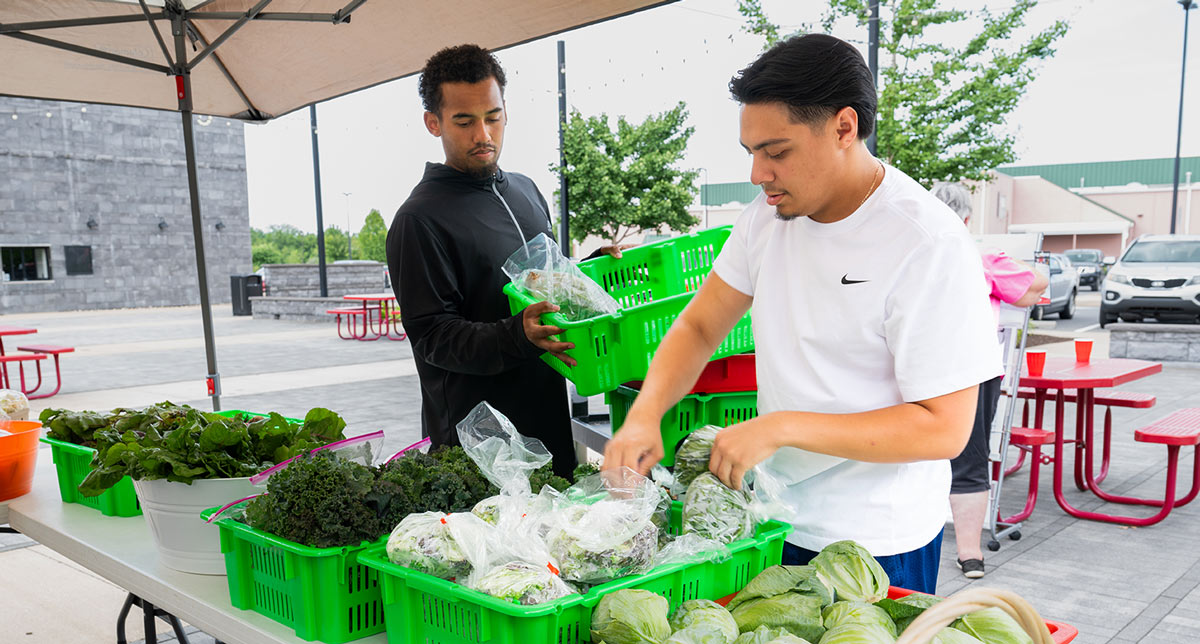
From Campus to Community
ucknell students are driven by a shared goal: to make a difference. To help them turn this ambition into impact, in July, the University transformed the Office of Civic Engagement into the Center for Community Engaged Leadership, Learning & Research. The new center builds upon a long-standing commitment to connect students with Susquehanna Valley residents and organizations through hands-on programs that benefit the community and deepen students’ understanding of complex issues, with initiatives addressing food security, economic development and sustainability. Central to this mission is a new minor in community engaged leadership, which challenges students to reframe conventional ideas about “community service” as they complete 260 hours of work with local organizations. “We know our students want to make a difference,” says Katie Faull, associate provost for local & global engagement. “Recognizing the knowledge that local community members already hold is where students can begin to discover how to best partner with their neighbors.”
Where Rigor Meets Relevance
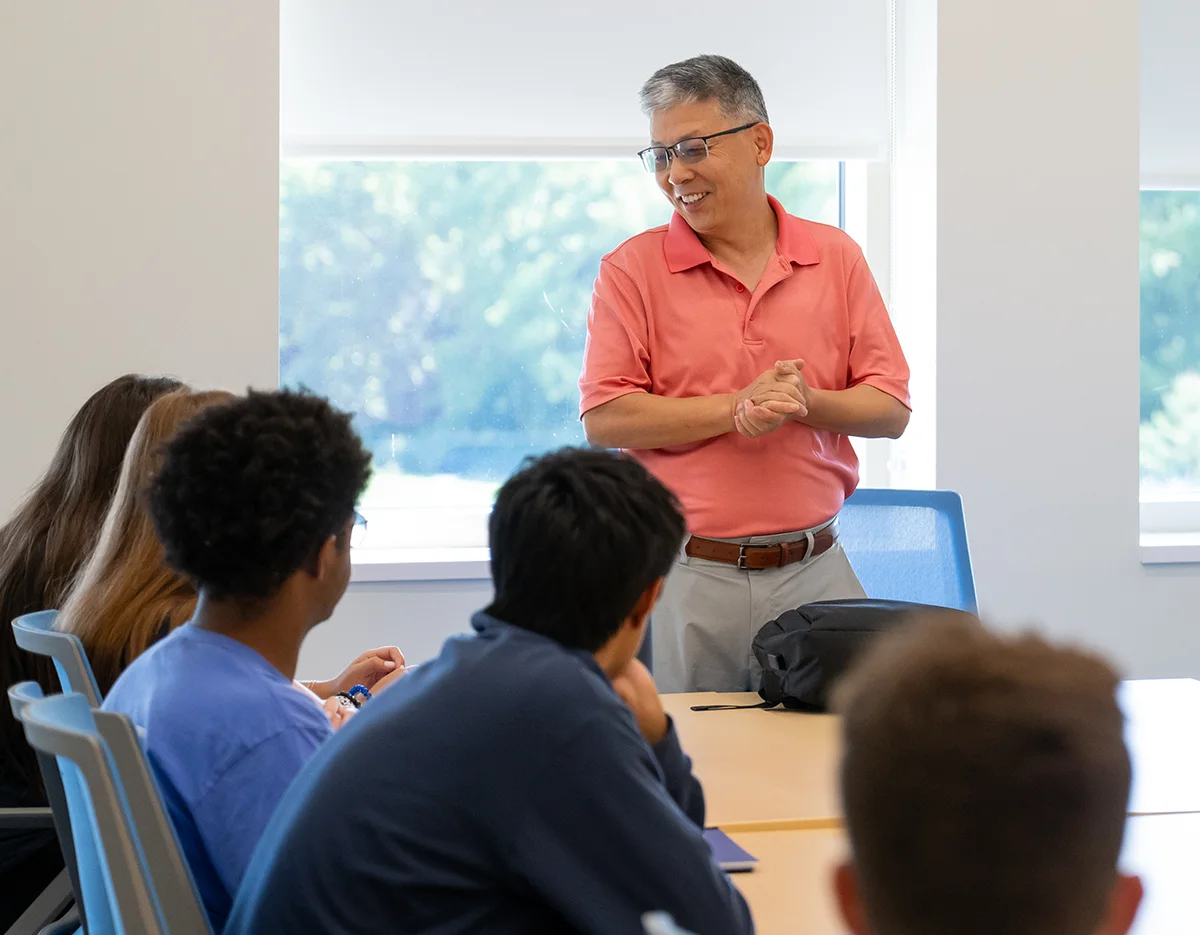
Guiding Global Perspectives
rofessor Zhiqun Zhu, political science and international relations (above), is recognized globally as an authority on Chinese foreign policy. His insights are regularly sought by a wide range of media outlets, from Chinese state media to publications in Hong Kong, Taiwan, Japan and the United States, including The Associated Press, National Public Radio and Newsweek. This broad scope reflects the nonpartisan approach Zhu brings to his work, offering analysis that transcends ideological boundaries. Zhu’s expertise enhances Bucknell’s academic reputation and students’ understanding of global affairs by providing them with a non-Western perspective on key international issues.

Championing Excellence
endy Sternberg joined Bucknell in July as provost, the University’s chief academic officer, marking a new chapter in her distinguished academic career. Drawn to Bucknell’s strong commitment to the liberal arts, Sternberg aims to enhance the University’s academic mission. With experience from Haverford, Union and Occidental colleges, she seeks to further integrate the liberal arts ethos across Bucknell’s three colleges. Sternberg is committed to supporting faculty, fostering collaboration among disciplines, and promoting innovative teaching and research to enrich the learning environment.

expert faculty, endless insights
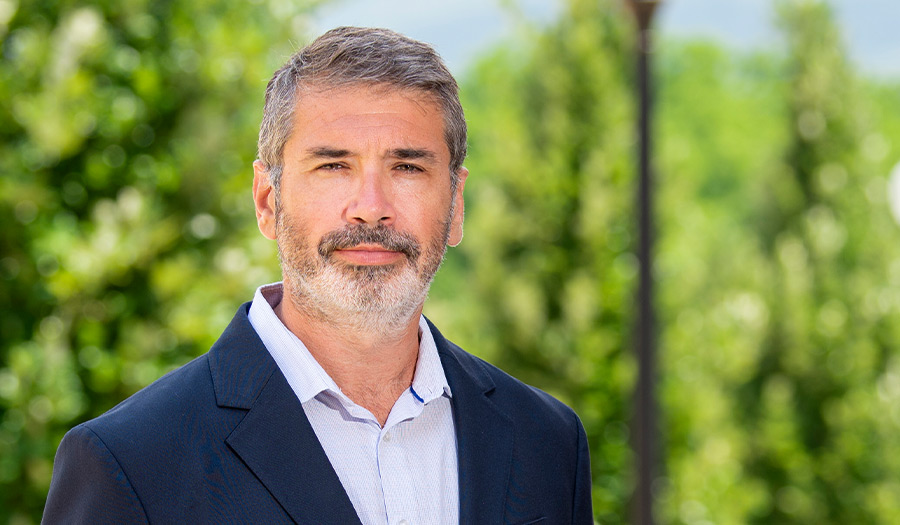
- Professor Matías Vernengo, economics and director of the Bucknell Institute for Public Policy, offers insights on inflation in the U.S. and South America. A former senior manager at the Central Bank of Argentina, Vernengo is a sought-after expert on global macroeconomic trends. Frequently featured on Al Jazeera and in South American media, he has provided analysis on the U.S. economy in interviews with NPR affiliates.
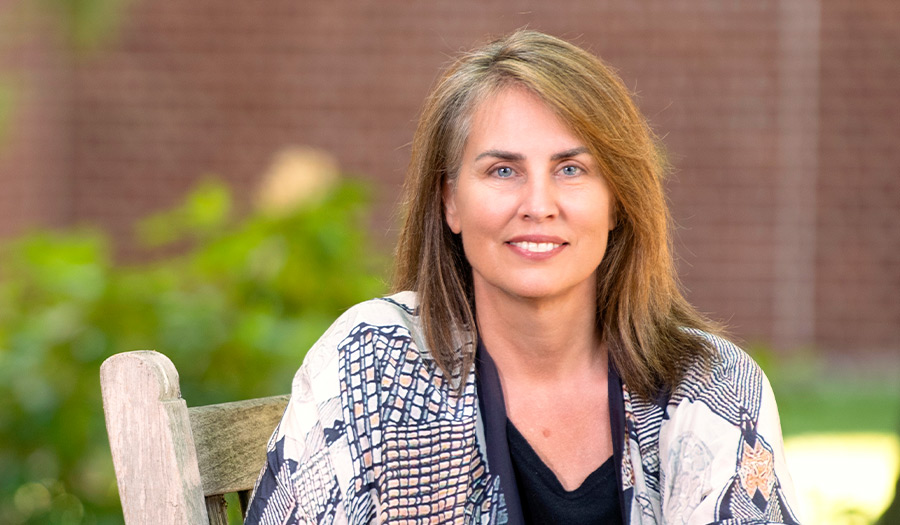
- Professor Judy Grisel P’16, psychology, is a behavioral neuroscientist and one of the world’s leading experts on addiction. Grisel’s work is inspired by her own struggle, chronicled in her 2019 New York Times bestseller Never Enough: The Neuroscience and Experience of Addiction. Her research focuses on the psychological characteristics of individuals likely to develop drug addictions.
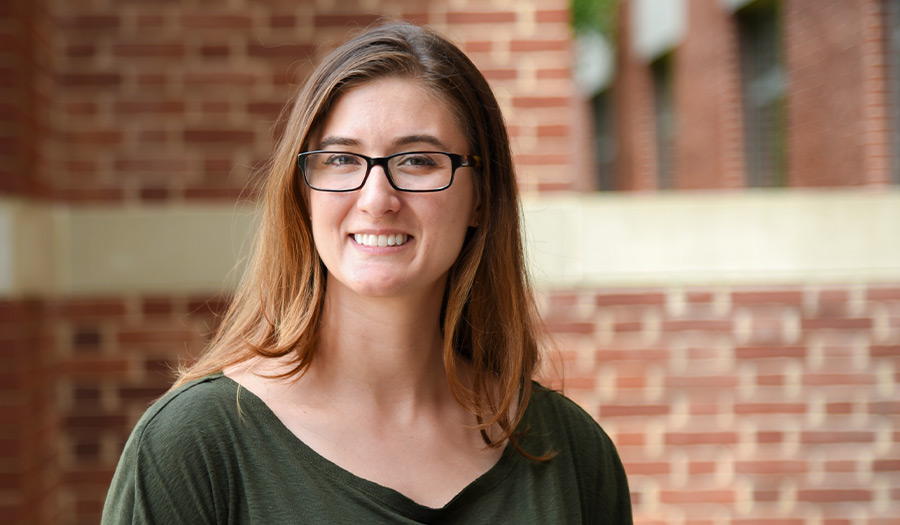
- Professor Sarah Lower, biology, and her research team explore why some firefly species in North America may be at risk of extinction. Last year, she co-authored a study that analyzed data from the citizen science program Firefly Watch and machine-learning models to find that climate change may pose a greater threat to firefly populations than previously thought.

- Bucknell biology professors DeeAnn Reeder P’16 and Ken Field were featured in National Geographic’s August 2024 cover story for their groundbreaking research on bats’ potential to carry the Ebola virus without falling ill. Supported by a $2.9 million grant from the National Institute of Allergy and Infectious Diseases, their five-year study involves collaboration with Muni University in Uganda. Reeder and Field have offered invaluable hands-on experiences for Bucknell students, who have participated in fieldwork and data analysis to support the research. Their findings aim to provide key insights into preventing pathogen spillover and future pandemics, deepening students’ engagement with real-world scientific challenges.
Nurturing Our Students
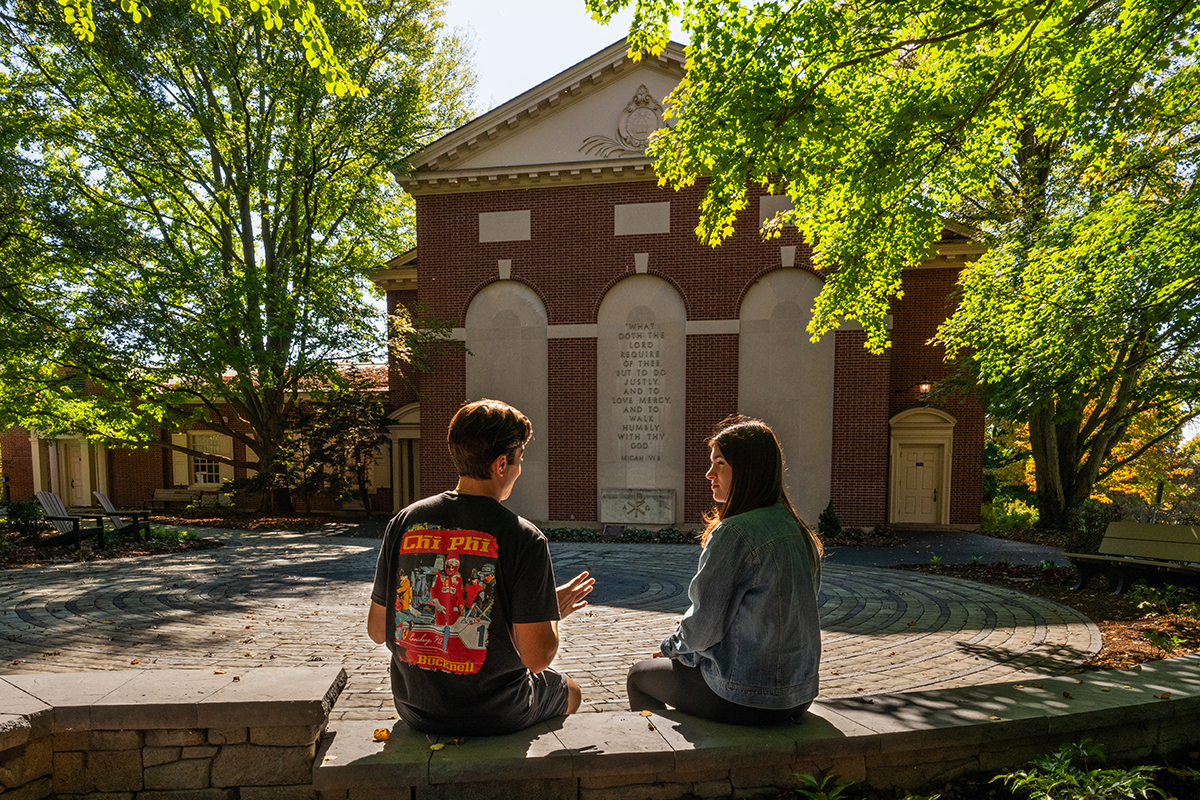
Calm Minds Thrive
he demands of rigorous coursework and a nonstop schedule can make academic life feel overwhelming. For students, finding moments to release stress and reconnect with themselves can help to restore balance. With this in mind, this past summer, a stone-inlaid labyrinth (above) was installed behind Rooke Chapel, complementing an existing labyrinth at the Bucknell Farm.
The labyrinths offer two calming places where Bucknellians can quiet their minds and regain mental clarity and focus. Walking the labyrinth can be a cathartic experience, helping individuals process emotions and release negativity. “The labyrinths provide a simple yet profound practice of centering oneself,” says Kurt Nelson, director of religious & spiritual life. “In the midst of our busy lives, the winding path of the labyrinth offers a moment of pause, allowing us to return to our daily tasks with a renewed sense of calm and focus.”
Labyrinths have historical Christian roots and were often incorporated into church architecture. Over time, they took on a broader spiritual significance, becoming meditative spaces for people of various faith traditions seeking peace and introspection.
The labyrinths have become integrated into campus life. Professor Jennie Stevenson, psychology, has used the Rooke Chapel labyrinth as a setting for her Neurophysiology of Wellbeing class, and the University’s Multi-Faith Coalition holds weekly gatherings there.
These spaces align with Bucknell’s broader effort to support mental and emotional well-being. “Having such visible and accessible spaces on campus is invaluable,” Nelson says. “These labyrinths invite everyone to take a moment to center themselves, whether through a guided session or a personal, spontaneous visit.”
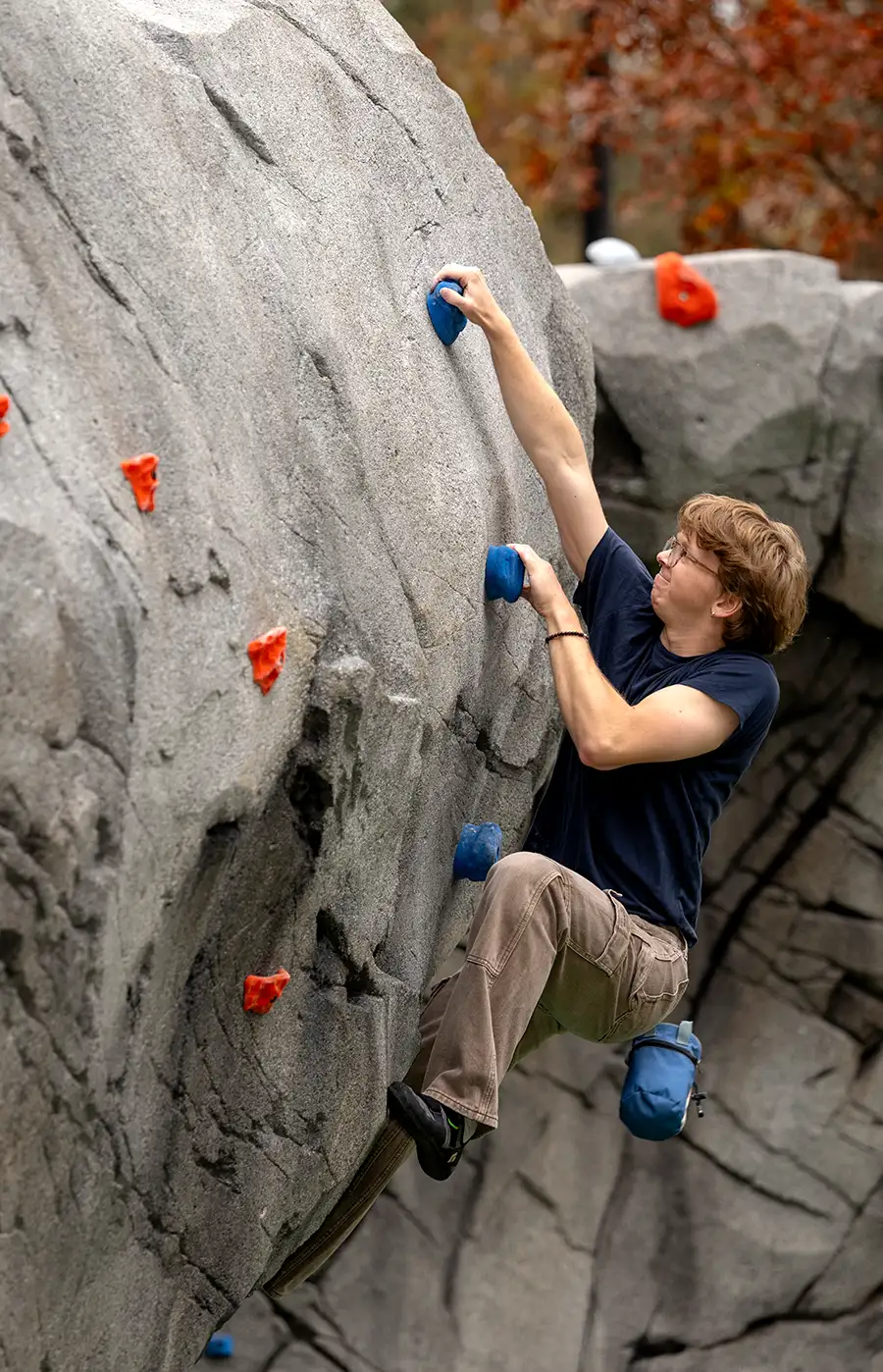
Scaling new heights
Holistic Health
tudies indicate that today’s students are experiencing higher levels of anxiety, stress and mental health challenges than previous generations. Academic pressures, social media influence and the uncertainties introduced by the pandemic have contributed to this trend. At Bucknell, we are building a comprehensive network of programs and services to meet students’ evolving wellness needs.
In April, the University will participate in the American College Health Association-National College Health Assessment to evaluate health and wellness issues impacting students on campus. The survey will also provide the University access to data from over 100,000 students nationwide. The insights will guide Bucknell’s efforts to enhance student-centered care through a robust public-health model.
Investing in the Student Experience
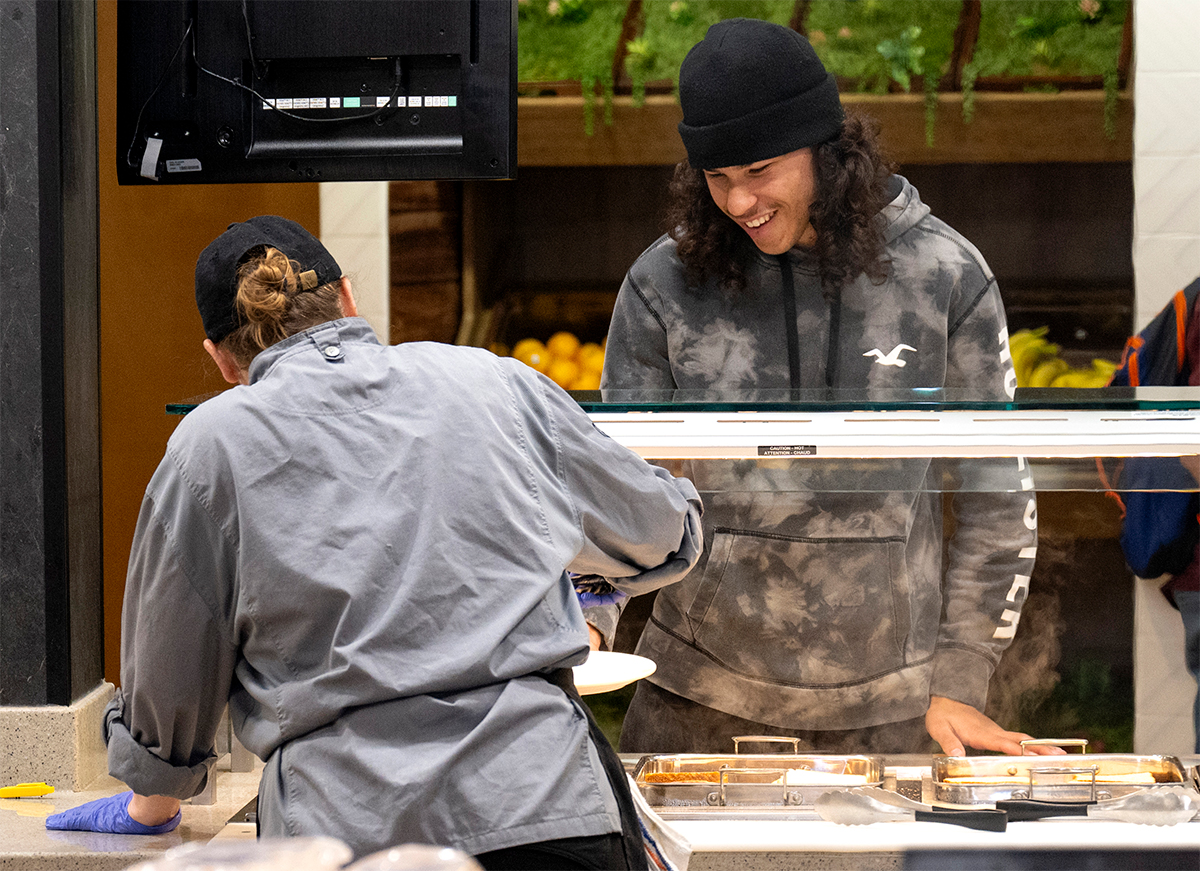
A Fresh Take
he college experience is defined by equal parts coursework, social engagement and self-discovery, with food serving as a vital element of that journey. In July 2024, Bucknell began a partnership with a new dining partner, Chartwells Higher Education, with the goal of transforming the dining experience for students. Raul del Orbe (below) has stepped into the newly created role of dining liaison, the first position of its kind at the University — and in higher education — to reimagine the role food can play in sustaining the student body and building a strong community.
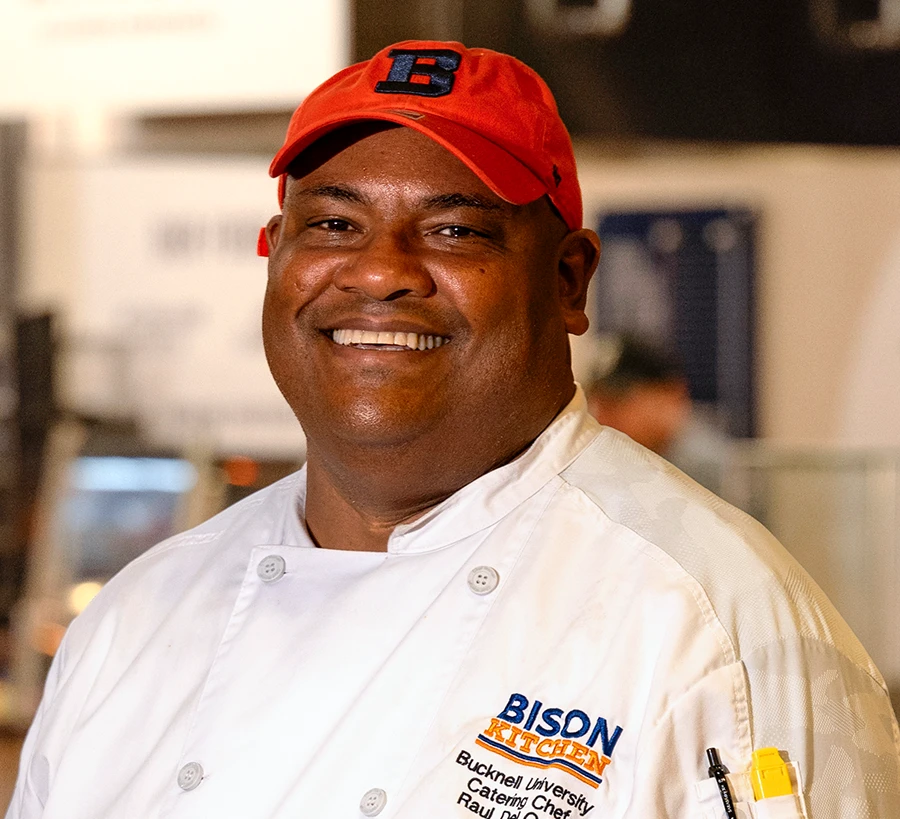
My job is to bring authentic, flavorful food to campus to meet the needs of a diverse student body. Strong flavors evoke a sense of home and create an opportunity for cultural exchange and community building. I work closely with students to make sure that food not only nourishes their bodies, but also opens their minds to new possibilities, ideas and cultures.
How does a dining liaison enhance the student experience?
For many students, going to college is their first time being on their own. A big part of becoming an adult and living independently is learning how to feed yourself, so I’m offering cooking classes that teach students how to prepare and budget for meals. Knowing how to cook inspires confidence, and that confidence extends to other areas of their lives.
What is your own relationship with food?
I come from a Latin background. My family is from the Dominican Republic, and I grew up in New York, which is a melting pot of many different cultures. I want to bring that — all those flavors and backgrounds — here for students to experience.
Energizing the Future
ustainability is a Bucknell value woven into all aspects of campus life. “Bucknell’s culture is forward-looking, and that applies to sustainability,” says Dustin Herner, campus energy manager. Small yet impactful upgrades are constantly at work behind the scenes, making the campus a better place to learn and live.
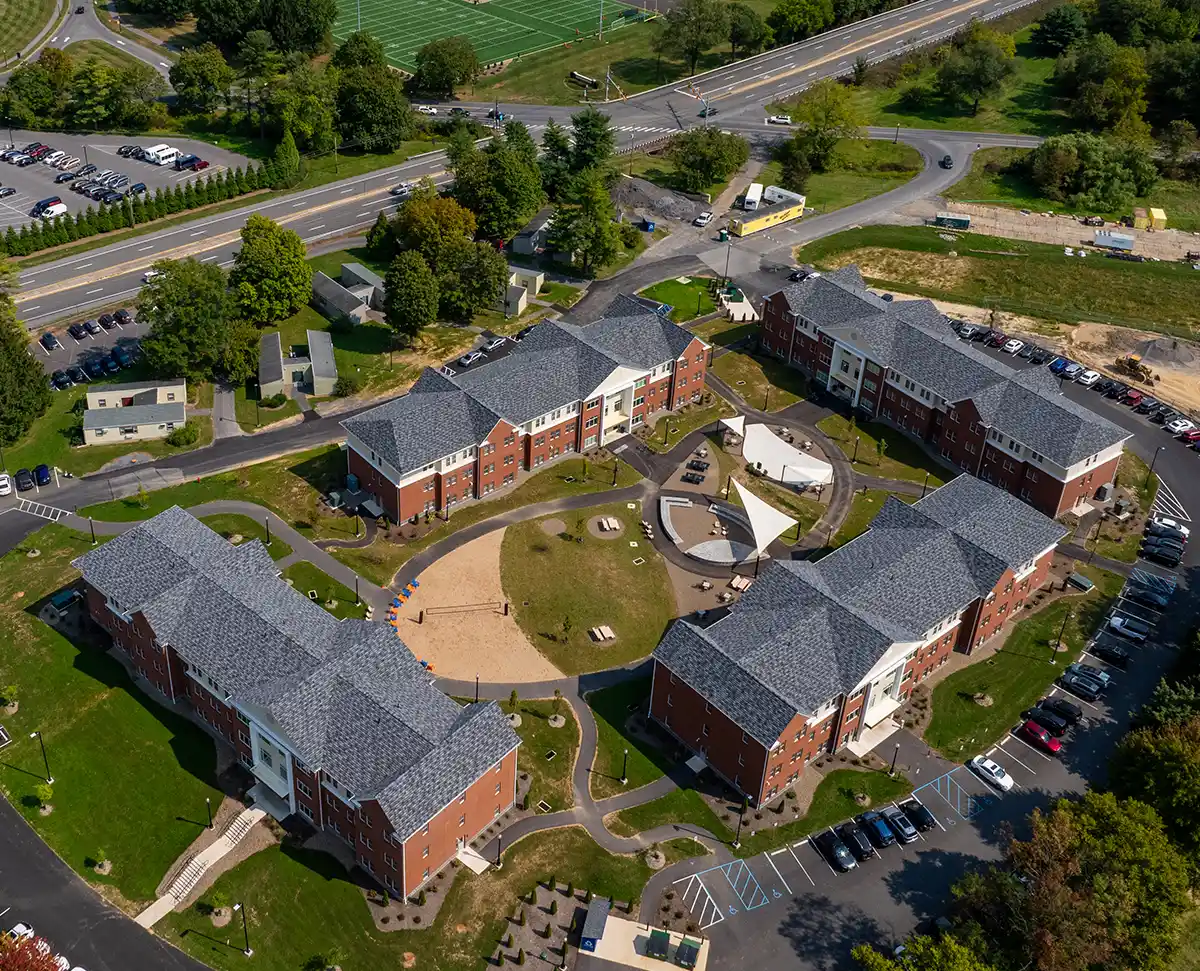
- The West Apartments are a model of sustainable design, featuring geothermal heating and cooling, LED lighting and water-source heat pumps.
- At the Weis Center for the Performing Arts, energy efficiency was enhanced in 2024 by replacing outdated equipment and improving the building automation system. Pneumatic controls were replaced with modern electronic consoles, substantial portions of ductwork were upgraded and energy-efficient lighting was installed.
- Thanks to an anonymous $1.65 million gift from an alumni couple, the Kinney Natatorium is undergoing significant upgrades, including a new HVAC system, which will boost operational efficiency.
Funding green projects: Bucknell’s Green Fund fosters innovation and drives positive environmental impact by providing financial assistance for campus-based green initiatives proposed by students, faculty and staff. “The University community is encouraged to submit proposals to help advance our sustainability goals and make a lasting difference for the campus and the environment,” Herner says.
Financial Update
Bucknell Budget Summary
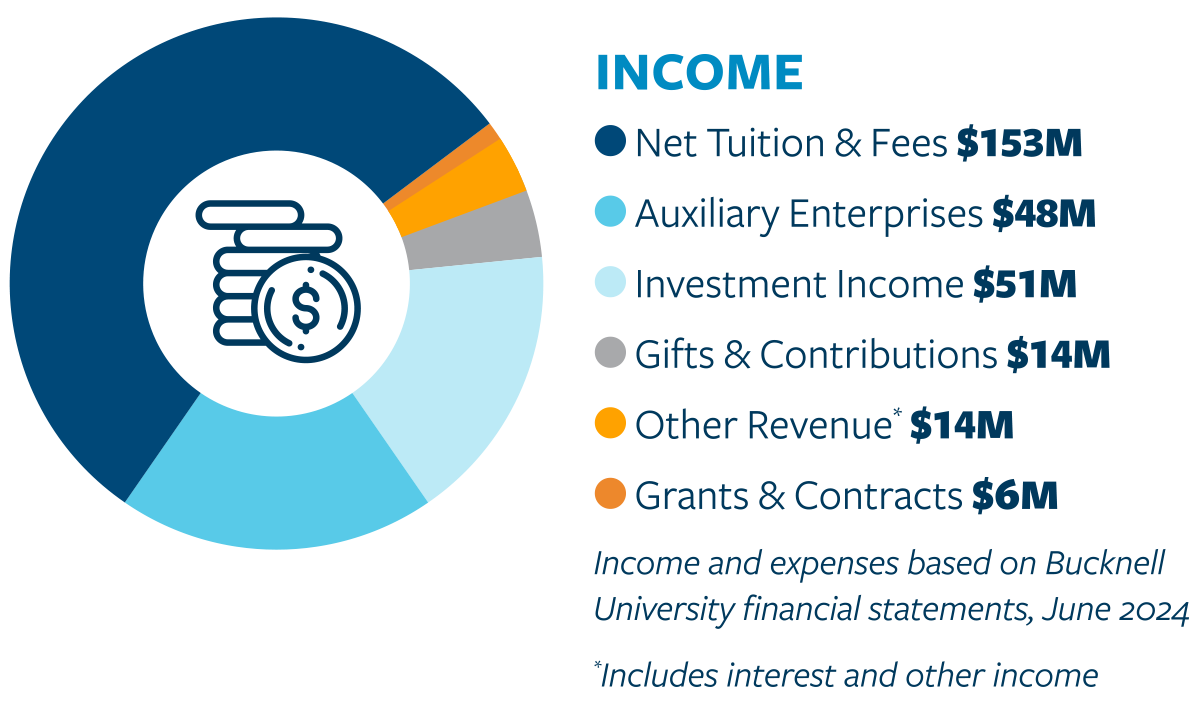
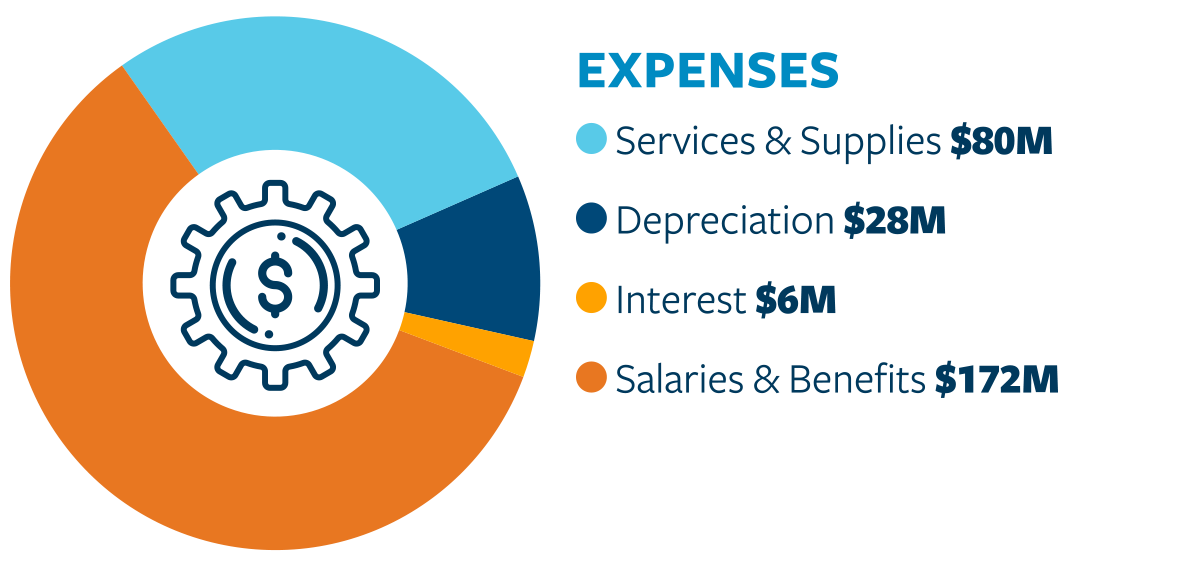
Fueling the Future
TOTAL GIFTS
Total annual fund designation $14.1M
Total athletics giving $3.1M
The Bucknell Endowment
Categorization of Endowments*
INSTRUCTIONAL & ACADEMIC PROGRAMS 25%
GENERAL UNIVERSITY OPERATIONS 32%
FACILITIES 3% STUDENT SERVICES 2%
ATHLETICS 2% *Percentages do not total 100 due to rounding
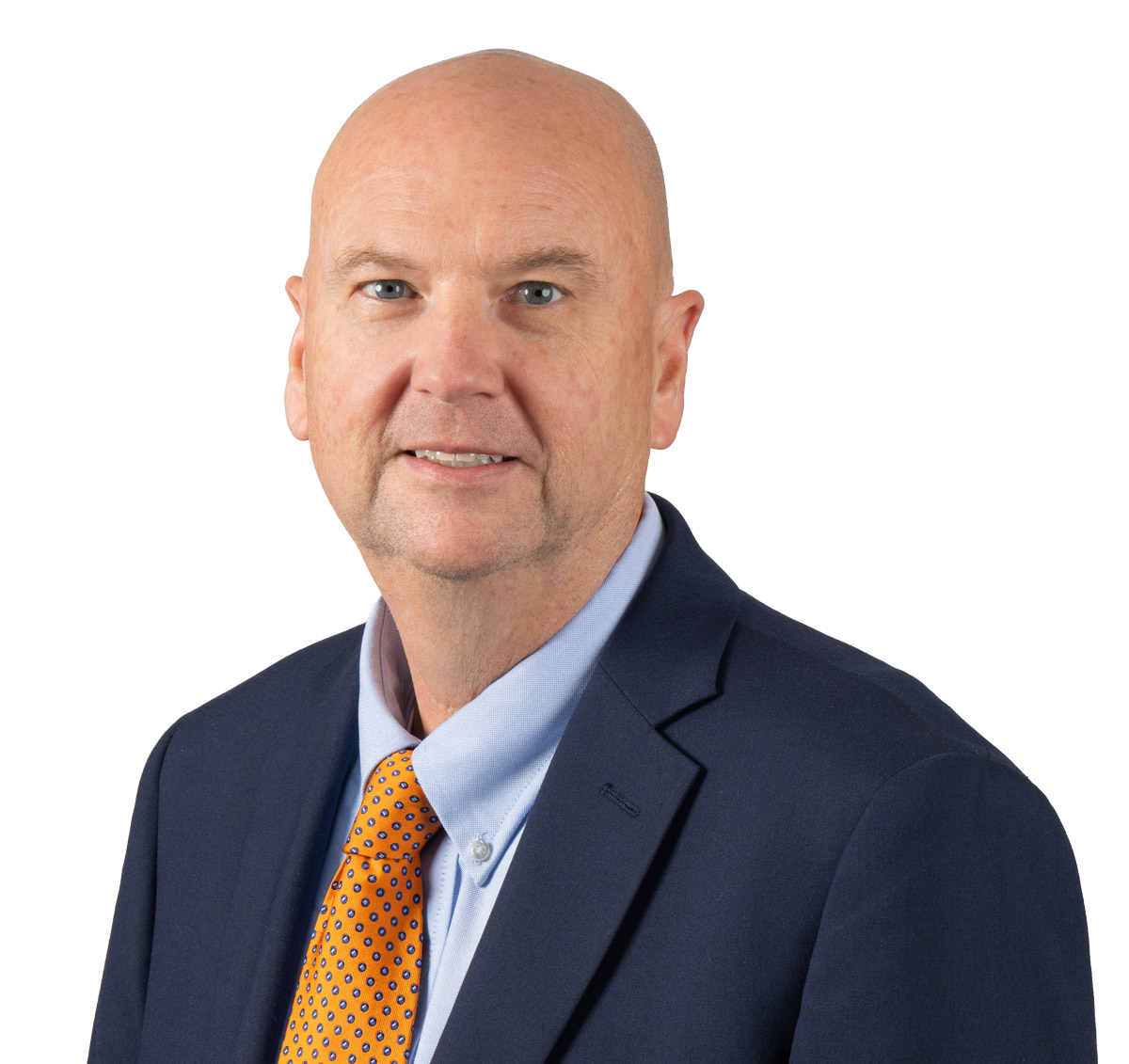
New Leadership
n September, H. Daniel Hungerford was appointed Bucknell’s vice president for finance & administration and chief financial officer, a critical role in developing strategic initiatives and fostering collaboration across campus. With an extensive background in budgeting, project management and operational efficiency, Hungerford will use his expertise in financial and strategic planning to guide the University in strengthening its financial operations.
University Leadership
Wendy Sternberg, Provost
Param Bedi, Vice President for Library & Information Technology
Vernese Edghill-Walden ’87, Vice President of Equity & Inclusive Excellence
Dan Hungerford, Vice President for Finance & Administration and Chief Financial Officer
Heather Johns P’27, Vice President for Marketing & Communications
Carol McLaughlin Kennedy ’96, Executive Director, Office of the President and University Secretary
Jeffrey Loss, Associate Vice President for Facilities
Teresa McKinney, Interim Associate Vice President & Fritz Family Dean of Students
Brad Putman, Richard E. Garman Dean of the College of Engineering
Michelle Roehm, Kenneth W. Freeman Professor and Dean of the Freeman College of Management
Scott Rosevear, Vice President for University Strategy & Advancement
Jermaine Truax, Vice President and Director of Athletics
Karl Voss, Douglas K. Candland Dean of the College of Arts & Sciences
Nicole Whitehead, Vice President for Talent, Culture & Human Resources
Wendy Sternberg, Provost
Param Bedi, Vice President for Library & Information Technology
Vernese Edghill-Walden ’87, Vice President of Equity & Inclusive Excellence
Dan Hungerford, Vice President for Finance & Administration and Chief Financial Officer
Heather Johns P’27, Vice President for Marketing & Communications
Lisa Keegan, Vice President for Student Enrollment, Engagement & Success
Carol McLaughlin Kennedy ’96, Executive Director, Office of the President and University Secretary
Jeffrey Loss, Associate Vice President for Facilities
Teresa McKinney, Interim Associate Vice President & Fritz Family Dean of Students
Brad Putman, Richard E. Garman Dean of the College of Engineering
Karin Rilley, Vice President, General Counsel and Chief of Staff
Michelle Roehm, Kenneth W. Freeman Professor and Dean of the Freeman College of Management
Scott Rosevear, Vice President for University Strategy & Advancement
Jermaine Truax, Vice President and Director of Athletics
Karl Voss, Douglas K. Candland Dean of the College of Arts & Sciences
Nicole Whitehead, Vice President for Talent, Culture & Human Resources
Board of Trustees
Officers
Scott A. Perricelli ’94, P’25, Vice Chair
Erika N.D. Stanat ’90, Vice Chair
Samuel C. Nana-Sinkam Jr. ’10, Assistant Secretary
Officers
Scott A. Perricelli ’94, P’25, Vice Chair
Erika N.D. Stanat ’90, Vice Chair
Dawn M. Becker ’85, Secretary
Samuel C. Nana-Sinkam Jr. ’10, Assistant Secretary
John C. Bravman, President
Trustees
Daisy Auger-Domínguez ’95
Keren Bergman ’88
J. Frank Brown ’78
Thomas A. Buchholz ’84
Laureen Costa ’90
Frank A. Davis ’82, P’13
Lisa Cadette Detwiler P’18
Michael J. Dominguez ’91
Lance M. Fritz ’85
Martin K. Gilliard ’99
Robert J. Gilligan ’81
Eugene A. Gorab ’85, P’12, P’16
Sunil Gulati ’81
Donald N. Isken ’75, P’12, P’20
Alexandra Ahrens Jung ’92
Steven A. Kohn ’81
Bridget LaCroix Lecky ’09
Jordan H. Leiser ’06
John T. Reynolds ’92, P’27
Laurie E. Schmidt ’99
Franklin K. Schoeneman ’76, P’06
Garry D. Thaniel ’04
Kecia M. Thomas ’88
Scott Uebele ’00
Kathryn Boselli Vizas ’79
Audra M. Wilson ’94
Trustees
Daisy Auger-Domínguez ’95
Keren Bergman ’88
J. Frank Brown ’78
Thomas A. Buchholz ’84
Laureen Costa ’90
Frank A. Davis ’82, P’13
Lisa Cadette Detwiler P’18
Michael J. Dominguez ’91
Lance M. Fritz ’85
Makoto Fujimura ’83, P’13
Martin K. Gilliard ’99
Robert J. Gilligan ’81
Eugene A. Gorab ’85, P’12, P’16
Sunil Gulati ’81
Donald N. Isken ’75, P’12, P’20
Alexandra Ahrens Jung ’92
Steven A. Kohn ’81
Bridget LaCroix Lecky ’09
Jordan H. Leiser ’06
Carolyn Speer Miles ’83
John T. Reynolds ’92, P’27
Laurie E. Schmidt ’99
Franklin K. Schoeneman ’76, P’06
Garry D. Thaniel ’04
Kecia M. Thomas ’88
Scott Uebele ’00
Kathryn Boselli Vizas ’79
Audra M. Wilson ’94
The Bucknell University Endowment
The Basics
Bucknell employs a sophisticated, collaborative approach to endowment management, blending internal expertise with external professional insights to ensure strategic, long-term financial stewardship. This collaborative model integrates the efforts of Bucknell’s Investment Office, University leadership and the Investments Committee of the Board of Trustees, alongside strategic advisers and specialized investment firms with proven expertise. Together, they shape a comprehensive Investment Policy Statement that defines clear objectives, establishes risk management protocols, and aligns investment strategies with Bucknell’s long-term vision. This unified approach encourages diverse perspectives, fostering strategic thinking and responsible asset allocation to support the University’s enduring financial goals.
How does Bucknell allocate endowment funds?
Bucknell’s endowment investment strategy balances growth, risk management and financial sustainability. Guided by the Investments Committee and outlined in the Investment Policy Statement, the endowment is invested across a diversified portfolio, including domestic and international stocks, fixed-income securities, real estate, hedge funds, and alternative investments such as private equity and venture capital. These funds are managed by external professionals through public funds and private partnerships, ensuring cost-efficiency and expert oversight.
Key investment principles include maintaining sufficient liquidity to support annual operations, protecting against significant market downturns and minimizing management costs through strategic fund selection. The endowment does not invest in individual securities directly and allows third-party managers to make that selection. A small percentage of the endowment is allocated to the Student Managed Investment Fund, where students apply investment criteria under faculty guidance. This disciplined strategy ensures Bucknell’s financial sustainability while addressing current and future needs.
10 YEARS OF ENDOWMENT ACTIVITY
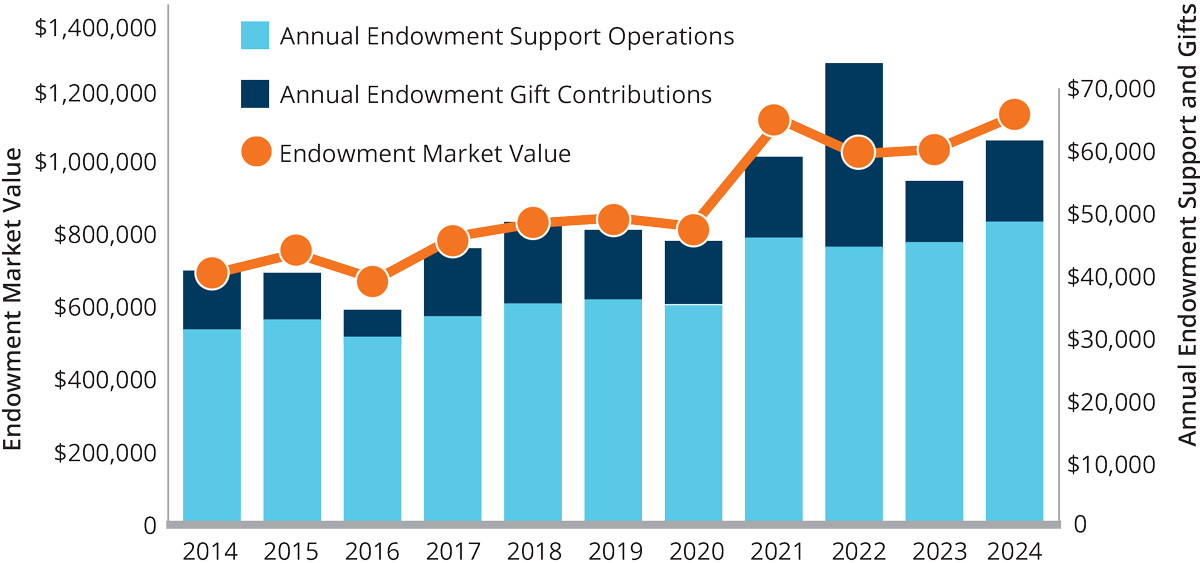
Fiscal Year 2024: Performance and Market Behavior
n 2024, strategic investments in public markets, fixed income and real estate led Bucknell’s endowment fund to hold steady at a value of $1.17 billion.
The endowment’s fiscal year performance exceeded its primary return objective of CPI+5.5%, which is designed to meet a spending rate in support of the University operating budget, account for inflation and encourage growth. However, the endowment underperformed relative to its internal benchmark, which assesses the health of the endowment’s performance against a selective group of public market indices aligned with its investment objectives. This benchmark is guided by a long-term strategic asset allocation framework that shapes the portfolio’s construction and evaluates the effectiveness of the long-term investment strategy. The endowment delivered a positive absolute return of 10%, surpassing its primary return target of 8.9% (CPI +5.5%) but trailing the internal benchmark, which returned 13%.
A strong public equity market persisted through global tensions and climate challenges, with growth largely driven by technology and AI. U.S. economic growth slowed but was supported by a solid job market and consumer spending, encouraging hopes for lower interest rates. While European and Asian markets had mixed results, technology and renewable energy continued to attract private investment. Despite some challenges, investor optimism remained high in the face of ongoing global pressures.
(as of June 30, 2024)
Asset Allocation
Growth assets 64%
Hybrid assets 17%
Real estate assets 10%
Low-volatility assets 9%
STRATEGIC INVESTING
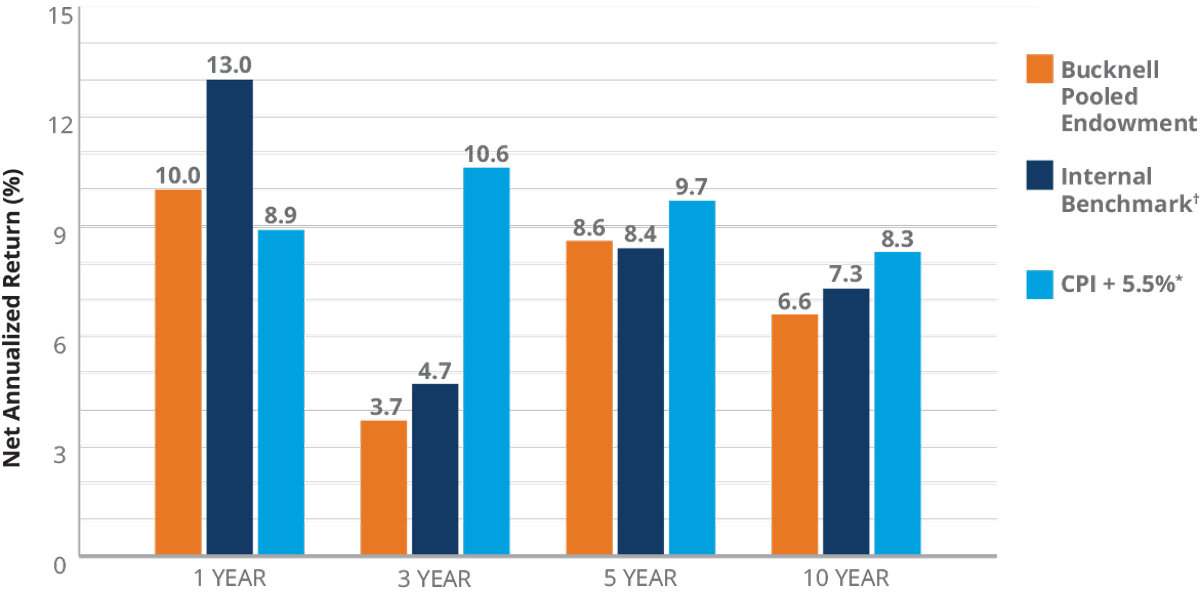
†Internal Benchmark: 64.0% MSCI ACWI Net; 10% HFRI FOF Conservative Index; 10.0% NCREIF Fund Index — Open-ended Diversified Core Index – 0.25%; 8.0% Bloomberg Barclays US Aggregate Bond Index; 6% S&P/LSTA Leveraged Loan Index + 150bps; 2.0% ICE BofA US High Yield Index
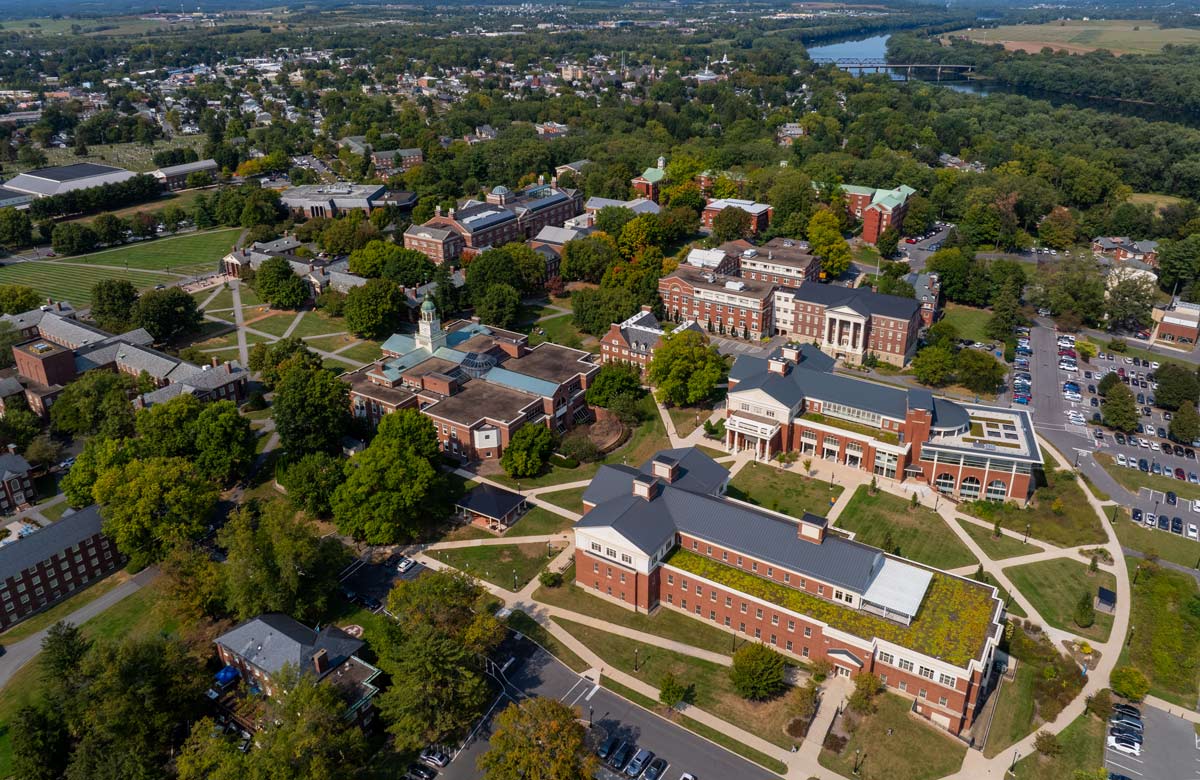
Responsible Investing
On-campus Initiatives
- Campus boasts 16 LEED-certified buildings, including one platinum and seven gold
- The Bucknell solar farm supplies 7.5 MW of power back to campus
- A biodigester diverts an average of 300 pounds of food waste from landfills
- Yearly sustainable move-out enables graduating students to donate gently used items to local charities
External Recognition
- The Princeton Review ranks the University among its Top 50 Green Colleges
- U.S. News & World Report recognized Bucknell among 14 Environmentally Friendly College Campuses
- The Association for the Advancement of Sustainability in Higher Education rated Bucknell Gold in the last two Sustainability Tracking, Assessment & Rating System review cycles
Our Expanding Endowment
his year, 26 endowments were created, enabling the perpetual existence of programs that define the Bucknell experience — one that is bold, transformative and enduring.
Management Scholars Endowment
Ira T. Ellis Jr. Engineering Endowment
Terry J. Hibbard Mechanical Engineering Scholarship
Michael J. Dominguez ’91 Fund for Data Science
Virginia Reed Demoreuille ’73 Memorial Scholarship*
John ’75 and Catherine Durocher Shafer ’76 Scholarship for Arts & Sciences
Peter Bevis Endowment
Obler Kaufman Family Scholarship
Susan M. Spaven ’65 Scholarship
Jason Snyder ’95, M’98 Fund
David R. Hamill ’81 Washington, D.C., Experience Fund
Jean Russell Fund for STEM Students*
Gray Family BPIP Internship Fund
JoAnn Patrick-Ezzell ’75 Scholarship
Convey Family Scholarship
Maxwell Family Scholarship
Coach Bill Wrabley ’51, M’60 Memorial Bison Football Training Program Endowment
Bucknell Varsity Men’s Soccer Fund
Bucknell Varsity Baseball Fund
Phil and Linda Sterner Fund for the Center for Access & Success
Dale Duff Memorial Fund
Jamie Diaferia ’94 Scholarship
Joseph J. Bosze ’39, G’94 Scholarship*
Fund for Men’s Basketball Excellence
Fountain Family Fund for the Bucknell Humanities Center
Nelson M. Smith, Jr. ’58 Fund for History
Jim Bolognese ’74 Scholarship in Statistics and Data Science
Susan Corridoni ’92 Fund for Entrepreneurship & Innovation
Harold and Sheila Richman Fund for Men’s Basketball
Management Scholars Endowment
Ira T. Ellis Jr. Engineering Endowment
Terry J. Hibbard Mechanical Engineering Scholarship
Michael J. Dominguez ’91 Fund for Data Science
Virginia Reed Demoreuille ’73 Memorial Scholarship*
John ’75 and Catherine Durocher Shafer ’76 Scholarship for Arts & Sciences
Peter Bevis Endowment
Obler Kaufman Family Scholarship
Susan M. Spaven ’65 Scholarship
Jason Snyder ’95, M’98 Fund
David R. Hamill ’81 Washington, D.C., Experience Fund
Jean Russell Fund for STEM Students*
Gray Family BPIP Internship Fund
JoAnn Patrick-Ezzell ’75 Scholarship
Convey Family Scholarship
Maxwell Family Scholarship
Cross Family Fund for Entrepreneurship and Innovation
Coach Bill Wrabley ’51, M’60 Memorial Bison Football Training Program Endowment
Bucknell Varsity Men’s Soccer Fund
Bucknell Varsity Baseball Fund
Phil and Linda Sterner Fund for the Center for Access & Success
Dale Duff Memorial Fund
Jamie Diaferia ’94 Scholarship
Joseph J. Bosze ’39, G’94 Scholarship*
Fund for Men’s Basketball Excellence
Fountain Family Fund for the Bucknell Humanities Center
Nelson M. Smith, Jr. ’58 Fund for History
Jim Bolognese ’74 Scholarship in Statistics and Data Science
Susan Corridoni ’92 Fund for Entrepreneurship & Innovation
Harold and Sheila Richman Fund for Men’s Basketball
Twelve other endowments reached full funding in 2023-24
James M. Gansinger ’67 Scholarship
100 Years of Women in Engineering Scholarship Fund
William Thoms, Jr. ’77 M.D. Engineering Scholarship
Bucknell on the Camino de Santiago Scholarship
Xin Liang & Xiu Chun Wong Chang Scholarship
Ehrlich Family Scholarship
Perricelli-Gegnas Center for Entrepreneurship & Innovation Endowment
David & Dianne Elderkin Scholarship
William ’73 and Judith ’75 Vogel Scholarship
Scott Thomas McMahon Scholarship
James M. Gansinger ’67 Scholarship
100 Years of Women in Engineering Scholarship Fund
William Thoms, Jr. ’77 M.D. Engineering Scholarship
Bucknell on the Camino de Santiago Scholarship
Xin Liang & Xiu Chun Wong Chang Scholarship
Ehrlich Family Scholarship
Dr. Richard A. Lobban, Jr. Study Abroad Scholarship
Perricelli-Gegnas Center for Entrepreneurship & Innovation Endowment
David & Dianne Elderkin Scholarship
William ’73 and Judith ’75 Vogel Scholarship
Scott Thomas McMahon Scholarship

